Our Stay On Quirpon Island In Newfoundland

Our stay at the Quirpon Lighthouse Inn on Quirpon Island, Newfoundland and Labrador, promised a unique and fascinating experience. The location is well written up as one of the five most remote and harshest places to visit and to stay anywhere in the world. Right there, we were hooked on the idea!
Quirpon Island is a small, deserted island off the extreme northeastern tip of Newfoundland’s Great Northern Peninsula.
The only way to get to Quirpon Island is by helicopter or dory. On the dock in a village by the same name, Quirpon, we hastily transferred our clothing into wet sacks and a hockey bag while we waited for our ride to arrive. The coast-guard trained “captain” of the boat advised us to travel light. The pickup point for our return trip might require a hike to the leeward shore should the weather become unfavorable.
The helmsman said that the ocean was calm that day, but still our dory smashed into huge rolling waves; a fine salt spray coated our faces. He informed us that, within the last week alone, 4 fishermen had been swept off their boats and lost to the inky depths in that very area.
That did little to instill confidence in me as I spotted monstrous surf where the waves were crashing into the looming rocky shore of Quirpon Island; my knuckles grew white as I clung to the edge of my seat.
The 30-minute boat ride soon brought us to calmer waters in a sheltered cove shouldered by soaring sheer faces of rock.
We could see why the island is described as a harsh bit of real estate. All that was first visible were rocks and rock formations of every shape, size, contour, and texture.
We were eager to walk in the footsteps of those lighthouse keepers who had been manning this bleak outpost since the 1860’s, though the lighthouse is now automated.
The Quirpon Lighthouse Inn in the original lightkeeper’s home and Guest House is a short hike from the dock where we disembarked.
This photograph was snapped later that day as fog crept over the island.
The modest climb to the lighthouse soon rewarded us with wonderful views.
The warm glow of lights inside the lightkeeper’s house beckoned us to enter. We were made to feel at home by all staff members who call the island home during the summer months. In the wintertime, all windows are boarded up so they won’t be blown out by the severe winds.
At 4:30 p.m., tea and sweets were served in the cozy living room where guests and staff alike eagerly shared stories. This would tide us over until dinner at 7 p.m.
The Guest House is where Bob and I would be sleeping for the next couple of nights. Most staff members and other guests were accommodated in the lightkeeper’s house.
I loved that the home-cooked meals were taken in the kitchen of the lightkeeper’s home with everyone seated around the table together. And no one could complain about the delicious selections: roast beef and gravy, mashed potatoes, turnips, carrots, fresh-baked bread and sumptuous blueberry pie. We left the table very satisfied.
After dinner, one of the cooks urged us to a window to see a Red Fox that comes around daily.
The fox’s fur was much lighter than what we are accustomed to seeing on foxes in Ontario, almost blonde in appearance. It certainly was being buffeted by the wind!
Following dinner, we and one other couple set off along the trail for the Guest House. Coming towards us was the Red Fox making tracks for another go at the small pile of scraps set out by the cook.
Quirpon Island is steeped in mystery and intrigue…there is the French sea captain who died here in 1861; the tragic tale of Marguerite, exiled here by her uncle when she became pregnant out of wedlock on board her uncle’s ship; Dead Sailor’s Pit where 6 shipwrecked sailors succumbed to exposure after huddling for days against winter storms; and the legendary beasts and demons said to torment ships and wayward seafarers in the 16th and 17th centuries.
Eager to experience the mystique of the island, Bob and I suited up and went for a walk. A couple of trails lead toward the plateau and along the cliffs, but fierce winds had us avoiding the edge.
Quirpon Island is magnificent in its barren windswept harshness. We were a captive audience there amid the rugged, raw landscape that seemed suitable for neither man nor beast,
yet a healthy growth of native plants, nourished by pockets of freshwater, softened the landscape and proved their tenacity to withstand the brutal conditions.
In the dwindling daylight, the lichens and other low-growing plants transformed stretches of bare rock into a tapestry of copper, ivory and green.
Bob and I didn’t venture too far given the hour and eventually retraced our steps to the boat landing. Small tidal pools held some surprises for us. Bob found a couple of Sea Urchins and what resembled chunks of coral.
The fox was watching us from a high vantage point further along one trail where we also caught a glimpse of her playful pup peaking over the hill. Snow remaining in several crevasses was contributing to the nighttime chill and growing blanket of fog.
It wasn’t far from our minds the warning that, once darkness falls, it is total with only the flash of the lighthouse beacon to guide us home. We hastened back to the Guest House.
Neither the fog horn nor the pounding surf at the base of the cliffs disturbed our sleep, and next morning, we were met with a thick veil of fog as we left the Guest House door to walk to the Lightkeeper’s House for breakfast.
Quirpon Island is blanketed with peat bogs and pools of water, so we changed into rubber boots to be prepared for the soggy conditions.
Many options were open to us for a hike, each to a point of interest on the island. These include the foundations of ancient sod huts used by the Vikings, and the site of the original settlement, L’Anse au Pigeon, a quiet and prosperous fishing village that was dreadfully impacted by a sinister murderer in 1929 before finally being abandoned in 1943. Bob and I struck out on the Red Trail to Pigeon Cove.
As fog drifted in and out, Bob and I wondered if we might catch a glimpse of Marguerite’s ghost said to still be walking the island; others have seen it. Though she eventually was rescued by a passing ship and taken home to France, Marguerite’s spirit haunts the island after 3 tortuous years spent there in the 1500s.
From the west shore of Pigeon Cove, we got a glimpse of Earl Pilgrim’s cabin on the opposite side of the Cove. One time, a Polar Bear came onshore from an iceberg or ice floe, broke into the author’s cabin and dragged out the mattresses.
As if to support the story of wayward Polar Bears, we shortly thereafter discovered the carcasses of 2 dead seals.
The island was pretty much fogged in by the time we returned to the Inn for lunch. This small outbuilding, gaily painted in white with bright red trim, added a touch of colour to the hazy view.
Using the map provided, Bob and I set out after lunch for Cod Cove 2.5 kilometres distant. Despite the close proximity, our explorations made for a lengthy afternoon.
We soon discovered several perimeter mounds marking some of the original Viking sod huts, one of which is seen above.
The west shore of the island is lined with sheer 200-foot cliffs and massive broken slabs of black igneous rock, but at Cod Cove…
we were able to walk down to the shore. That is where we found a few treasures…pieces of rope, lost buoys, and other odds and sods.
This large piece of gelatinous seaweed had washed ashore.
Back up on top of the plateau, Bob examines some of the broken pieces of rock that litter the ground. It would be easy to twist an ankle when walking on such uneven terrain.
Adding bursts of colour to the otherwise grey landscape were mounds of Moss Campion.
Mixed in with some of the Moss Campion were these delightful Northern White Mountain Avens, another species of alpine flower.
Newfoundland Oxytrope is another species of plant we found defying the harsh environment.
Bob and I had to be mindful of the peat and muskeg in the bowls of the plateau. The terrain in those depressions was so spongy that our boots sunk a good 12 inches with each step taken. It was akin to walking on thick foam.
Further inland, we saw evidence of a cart trail used by staff members to ferry guests’ luggage to and from the boat when the more distant landing spots have to be employed. In places, deep scars were left where all-terrain vehicles had become mired in the mud. In fact, one vehicle sat unattended, disabled with a flat tire.
Staff members abandoned that morning’s endeavours when rain set in, so Bob made to use the pickaxe left behind to further the man-made improvements to the trail.
Back at the Guest House later, I was keen to read more about the folklore and myths associated with Quirpon Island. We even purchased a couple of novels written by Earl Pilgrim, one detailing the true story of Marguerite de Roberval.
The weather conditions the following morning dictated a hike to Grandmother’s Cove five kilometres away. The ocean would be calmer there along the west side of Quirpon Island for departure back to the mainland.
Like bursts of sunshine, brilliant orange lichen brightened the surfaces of drab grey rocks near the edge of the cliffs.
As we neared Cod Cove, the departure point for some of the guests,
a shout from the captain of the awaiting boat drew our attention to Minke Whales just offshore. Every time they surfaced, we could hear them exhale.
When the 2 adults and one baby Minke Whale swam belly up, they were more visible because their white underbellies reflected light up through the turquoise water. They seemed to take great pleasure in that position.
At the same time, we began to take notice of the Great Black-backed Gulls soaring overhead. Their activity seemed to be concentrated over a nesting group of Kittiwakes on the cliffs below.
We felt blessed that the fog cleared sufficiently to allow views of several Northern Gannets flying over our heads.
Northern Gannets are the largest members of the gannet family. We had occasion to visit a huge nesting colony of Australasian Gannets in New Zealand. We only wish that we had been able to get closer views of our home-grown species.
As we neared Grandmother’s Cove, the path descended into a more sheltered and forested area of the island. For the most part, trees do not grow on Quirpon Island, but a few tenacious balsam firs have bent to the continual force of the wind and now are stooped evergreens referred to as Tuckamore Trees.
Nearing the shore meant much wetter conditions underfoot as runoff from the morning rain found its way to the lower ground. The pilot of our boat walked inland to meet us. By 11:30 a.m., we were back at the dock in Quirpon, ready to beat it back to Rocky Harbour.
Frame To Frame – Bob and Jean


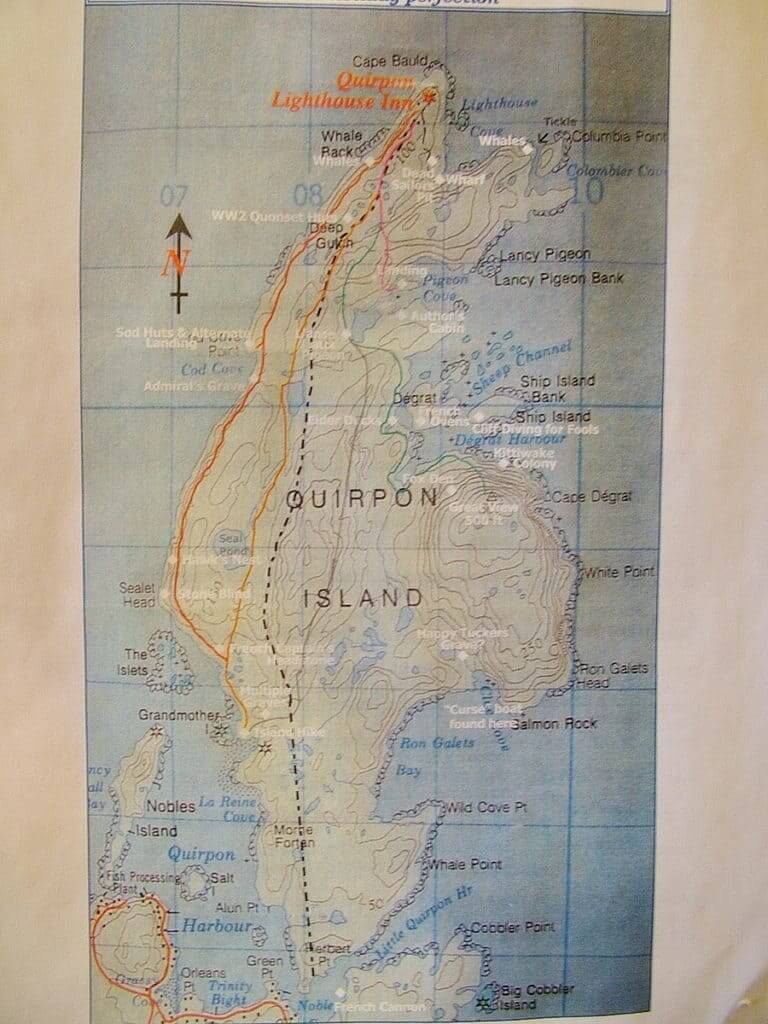
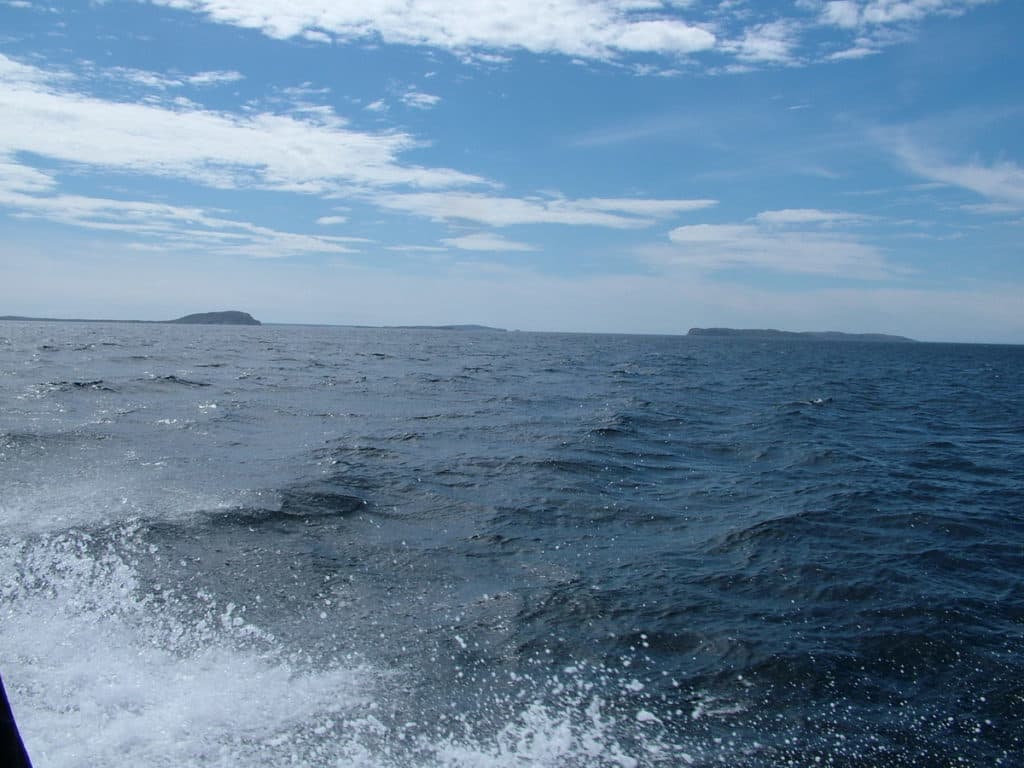
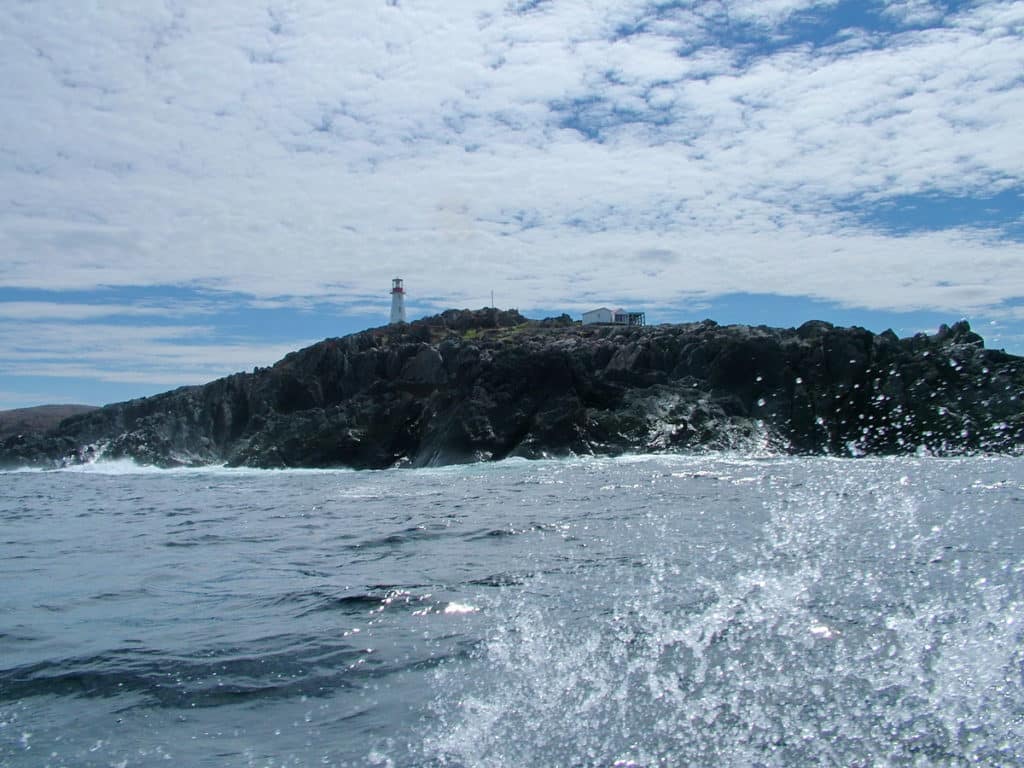
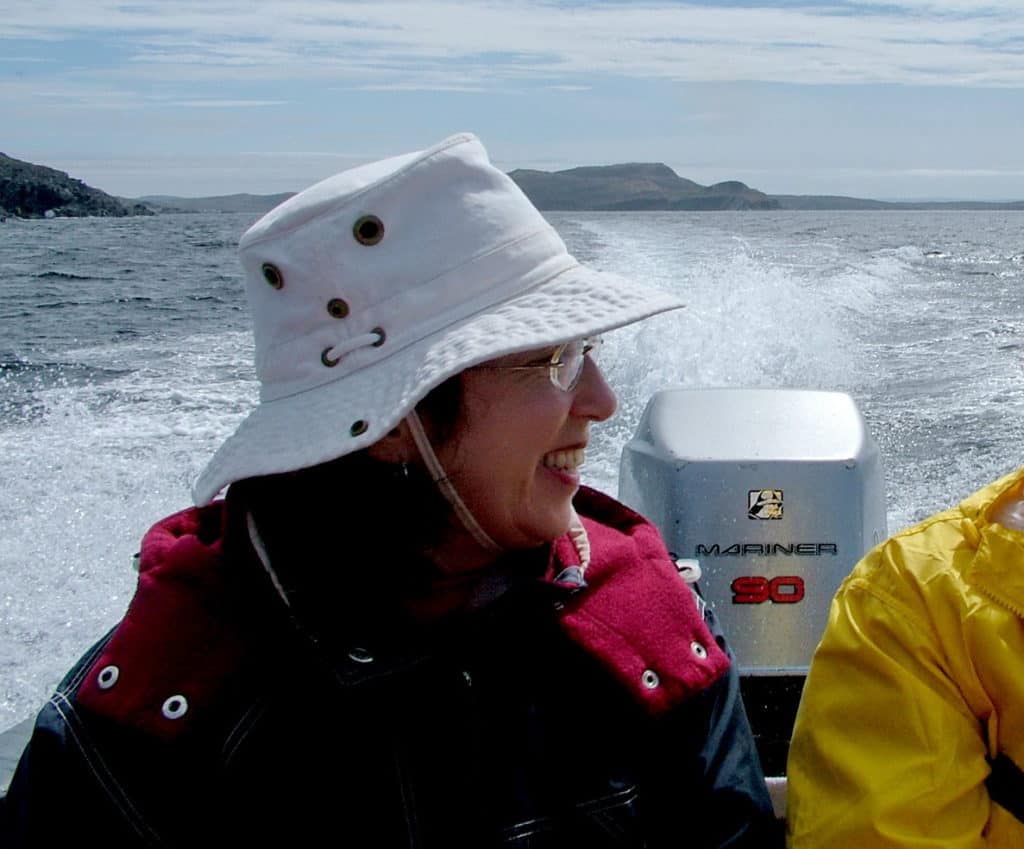
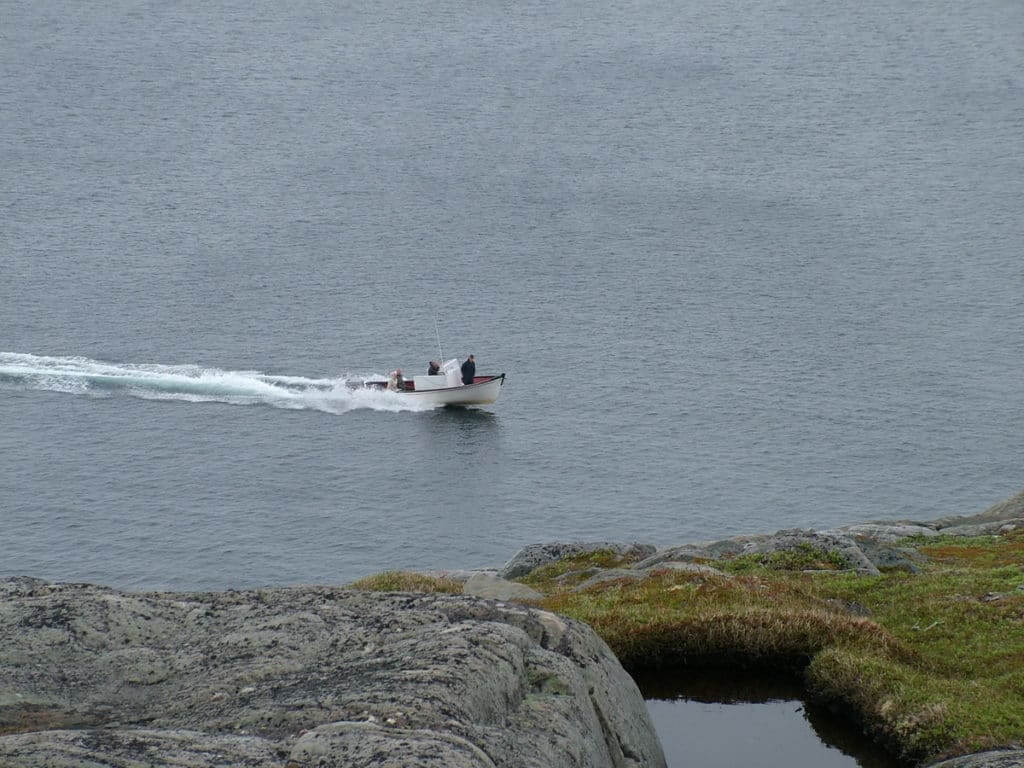
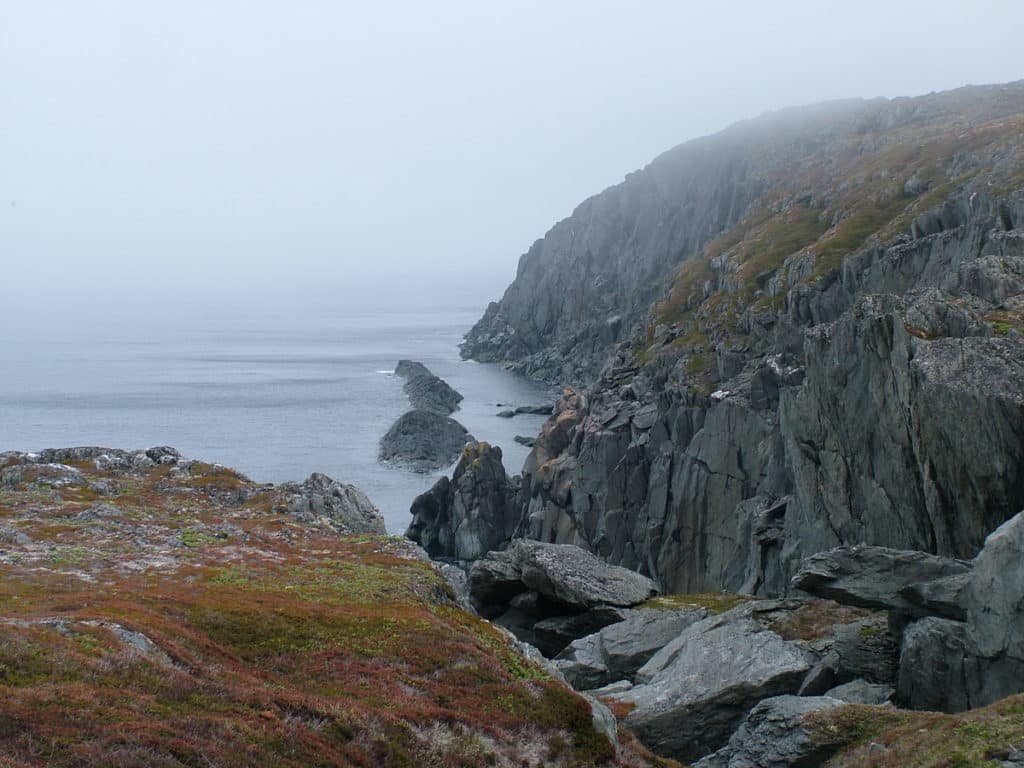

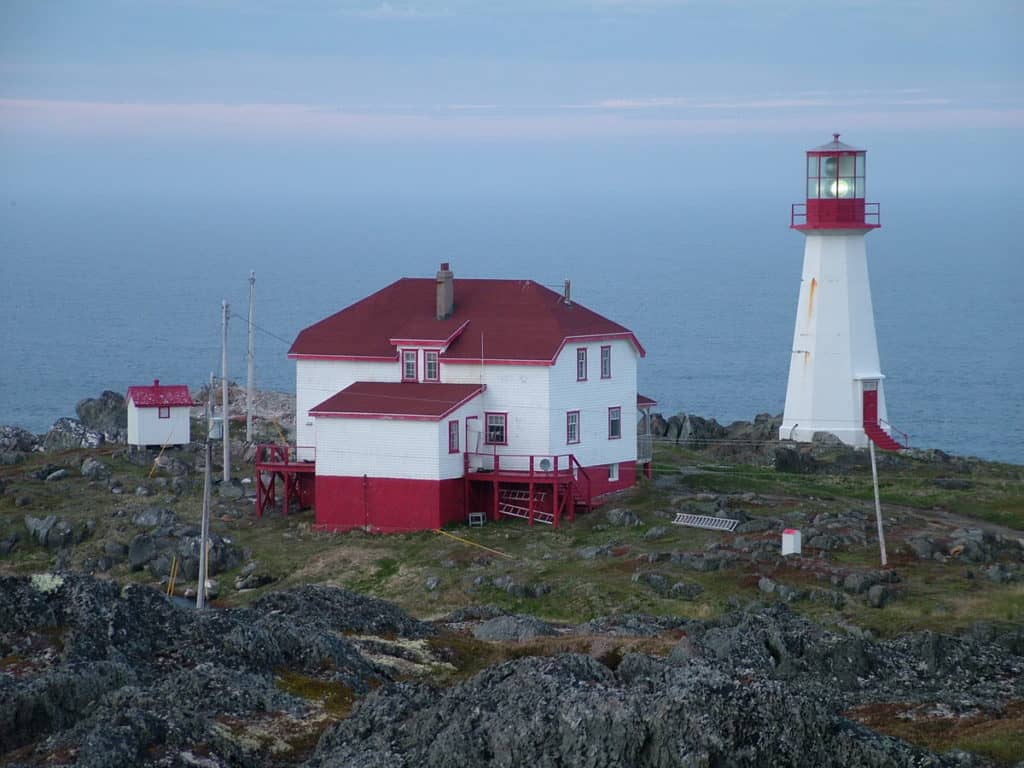
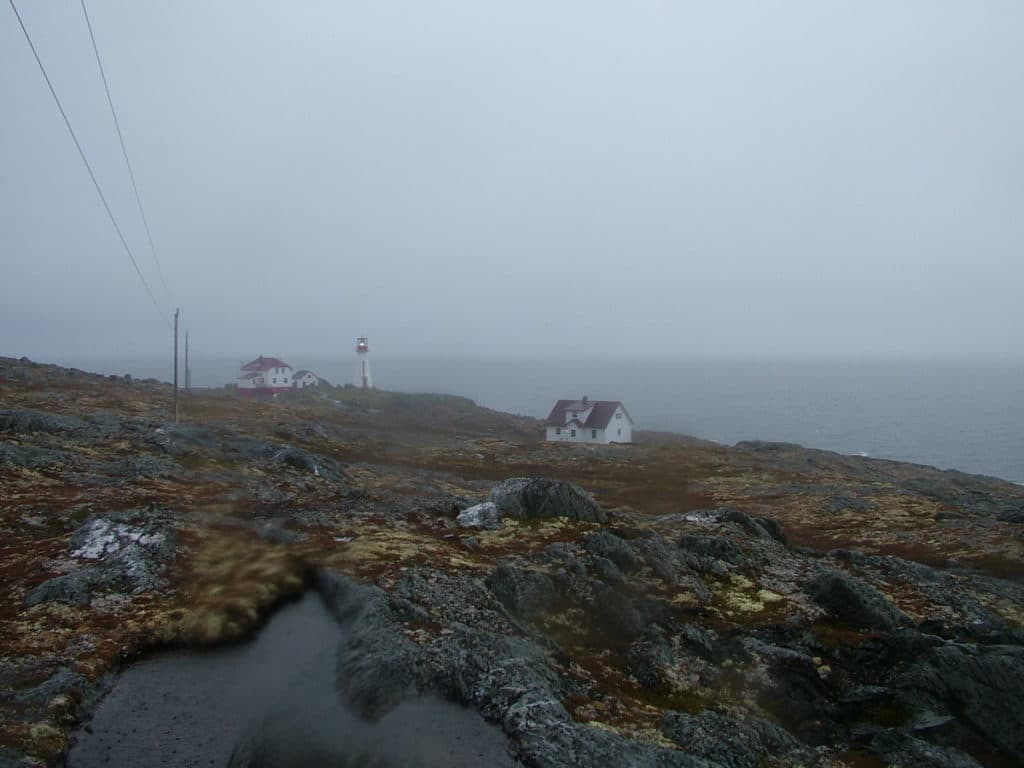
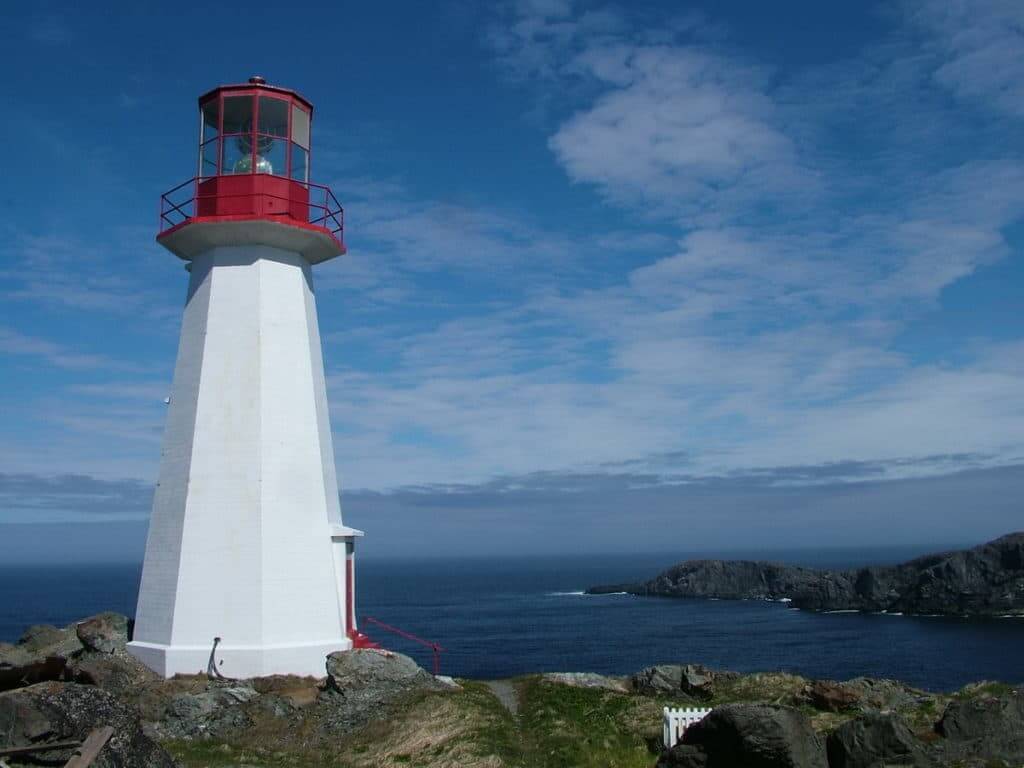
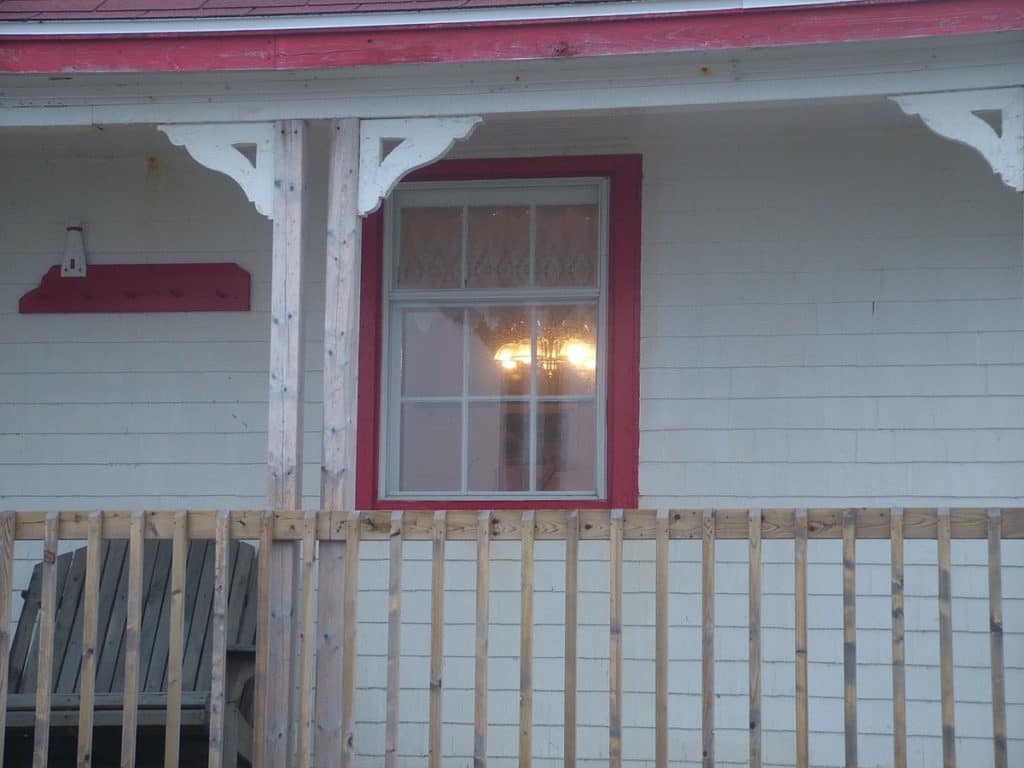
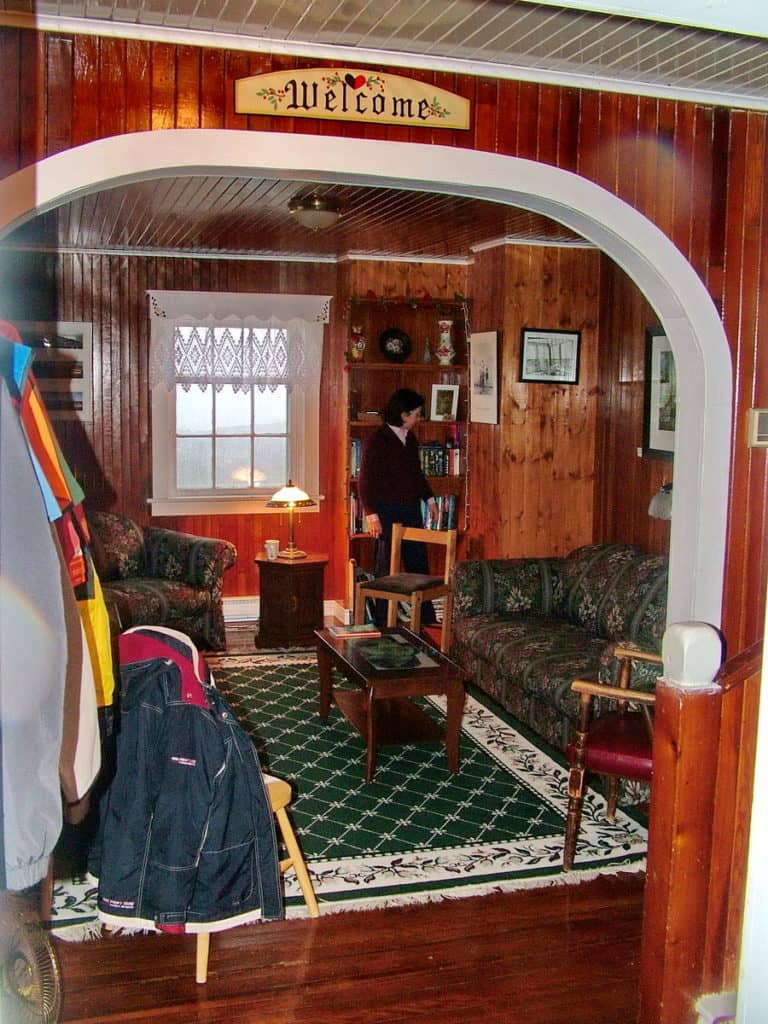
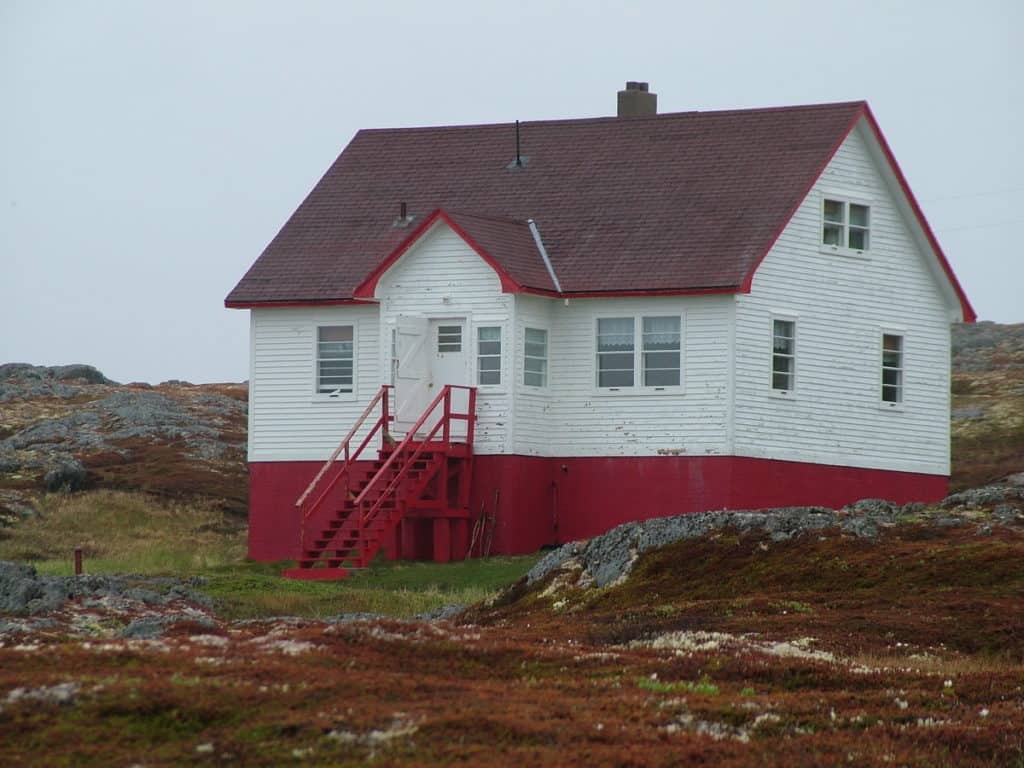
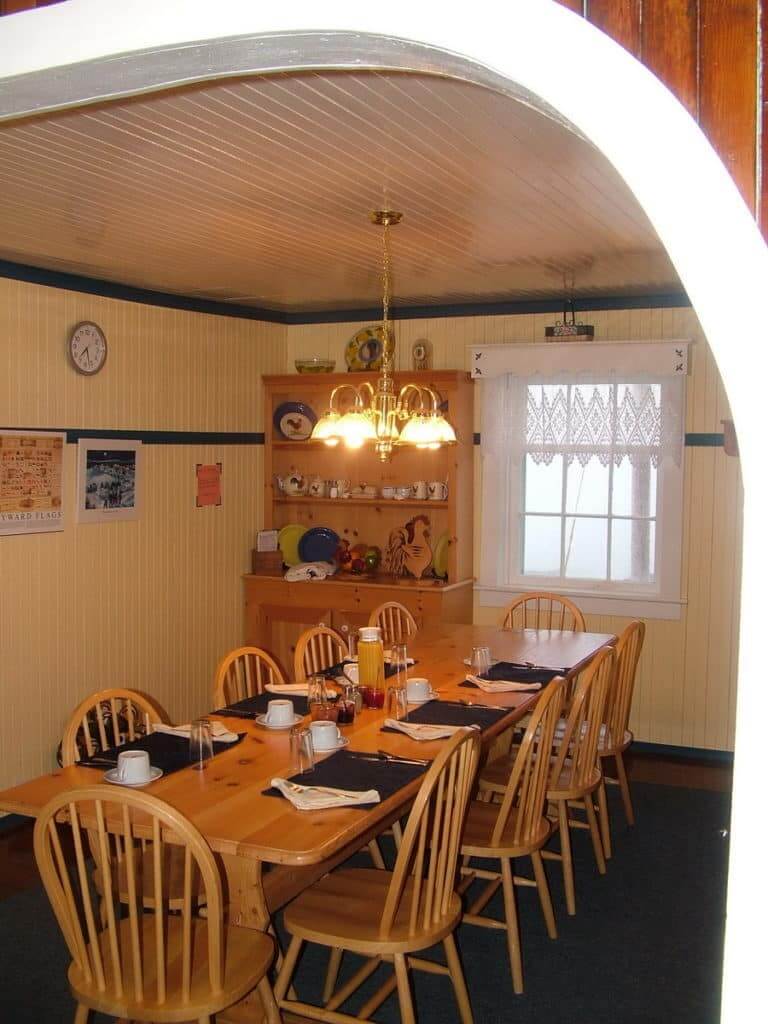
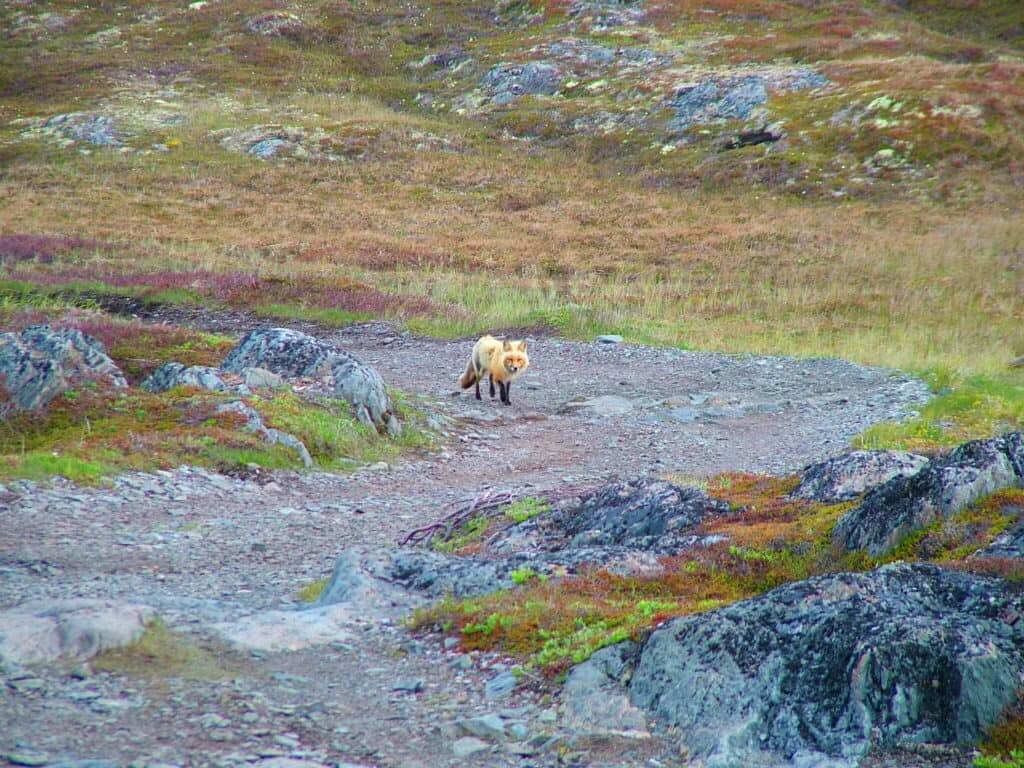
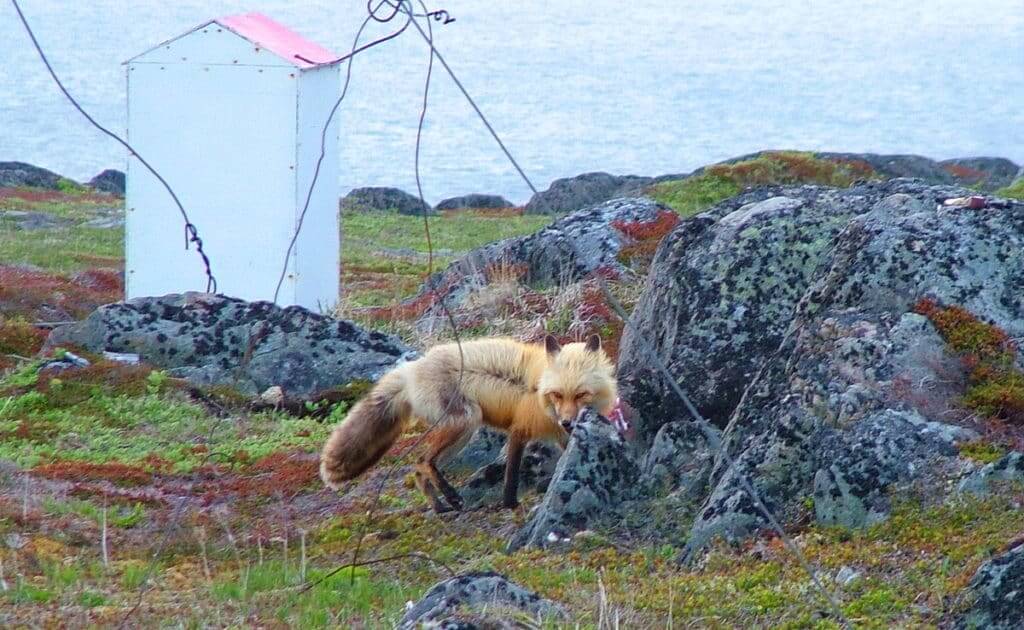
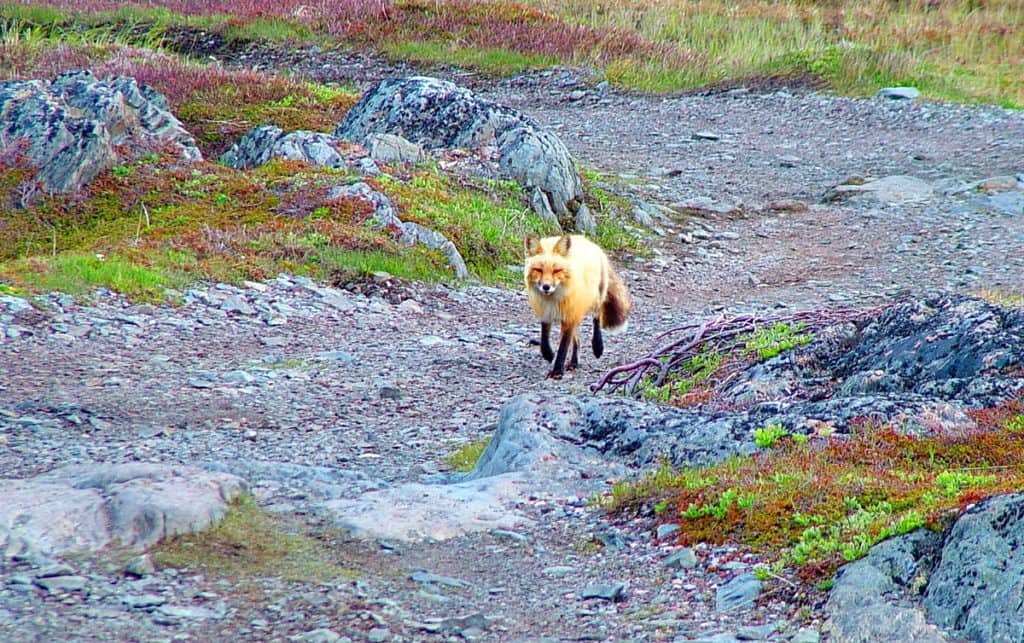
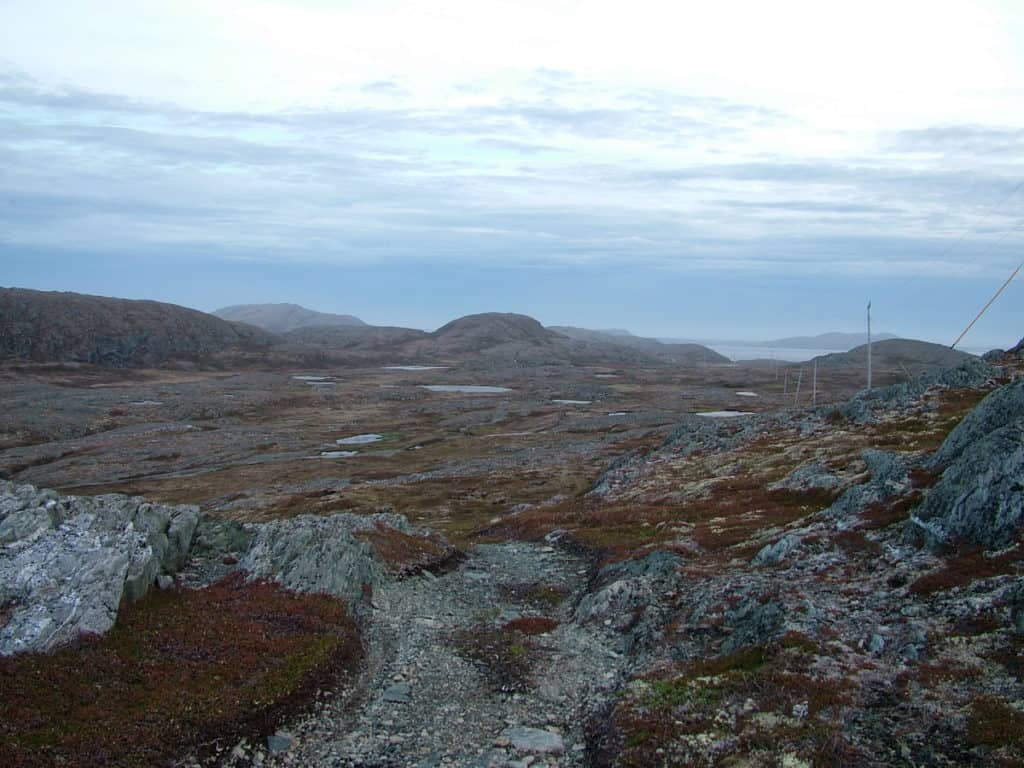
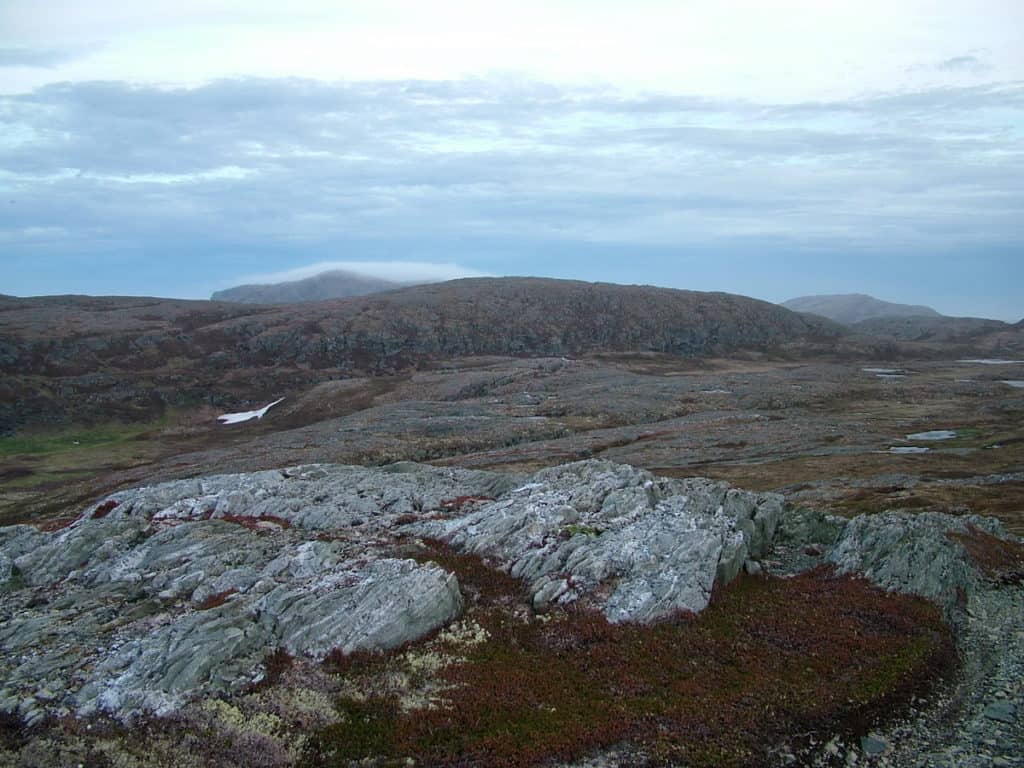
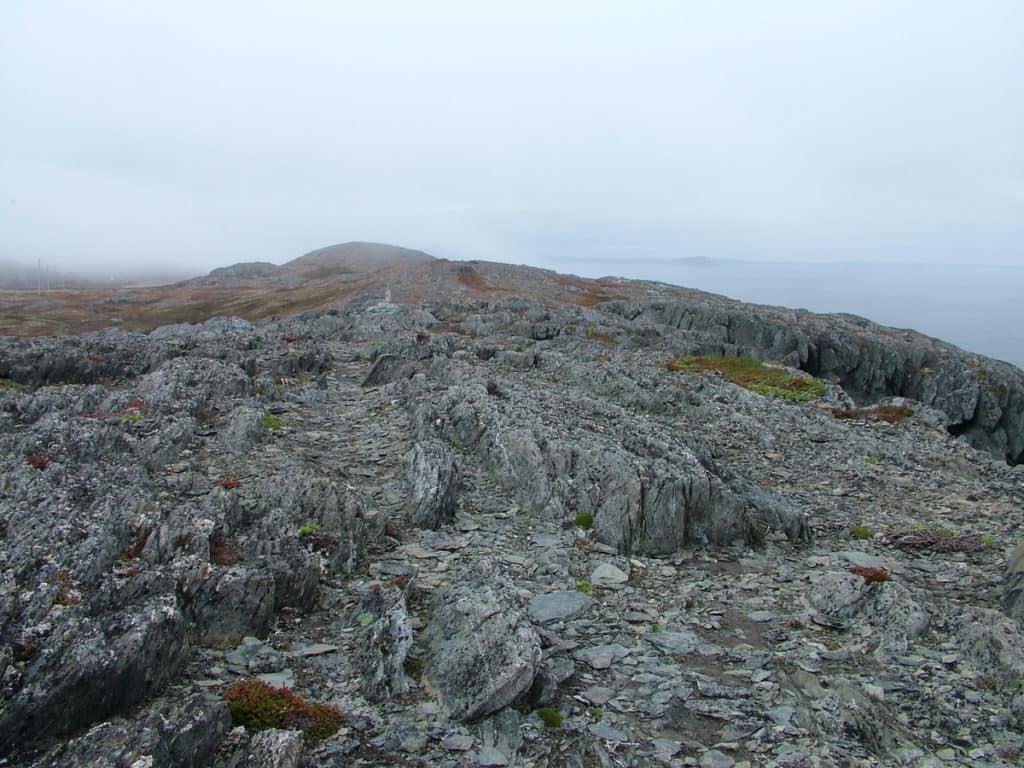
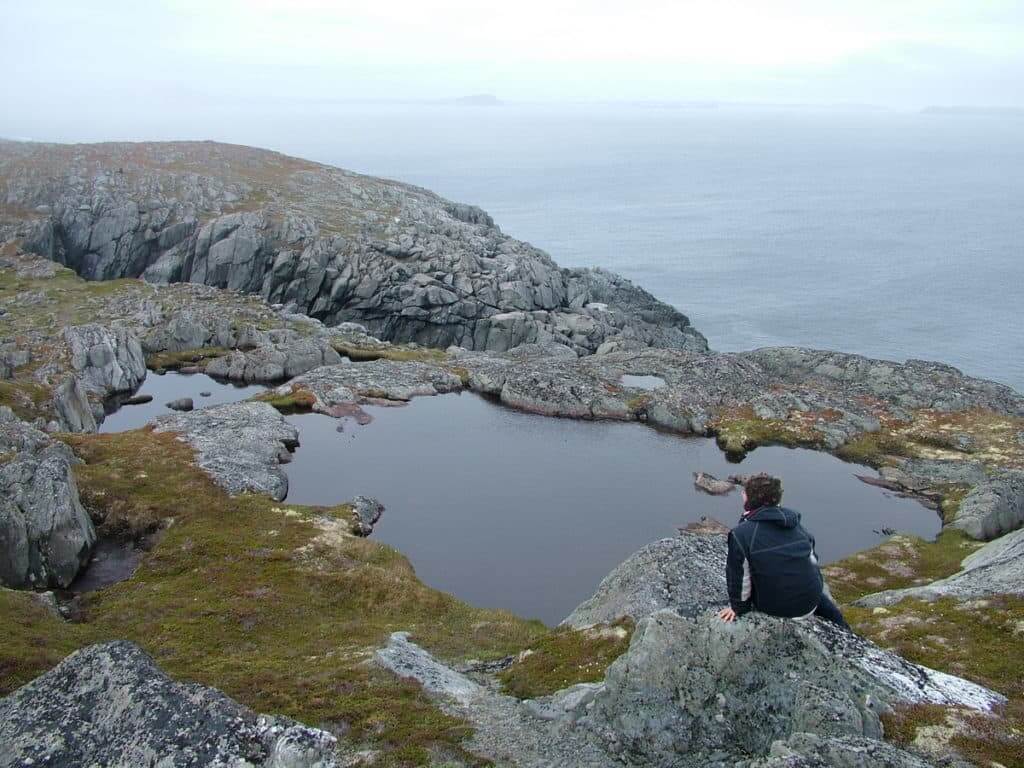
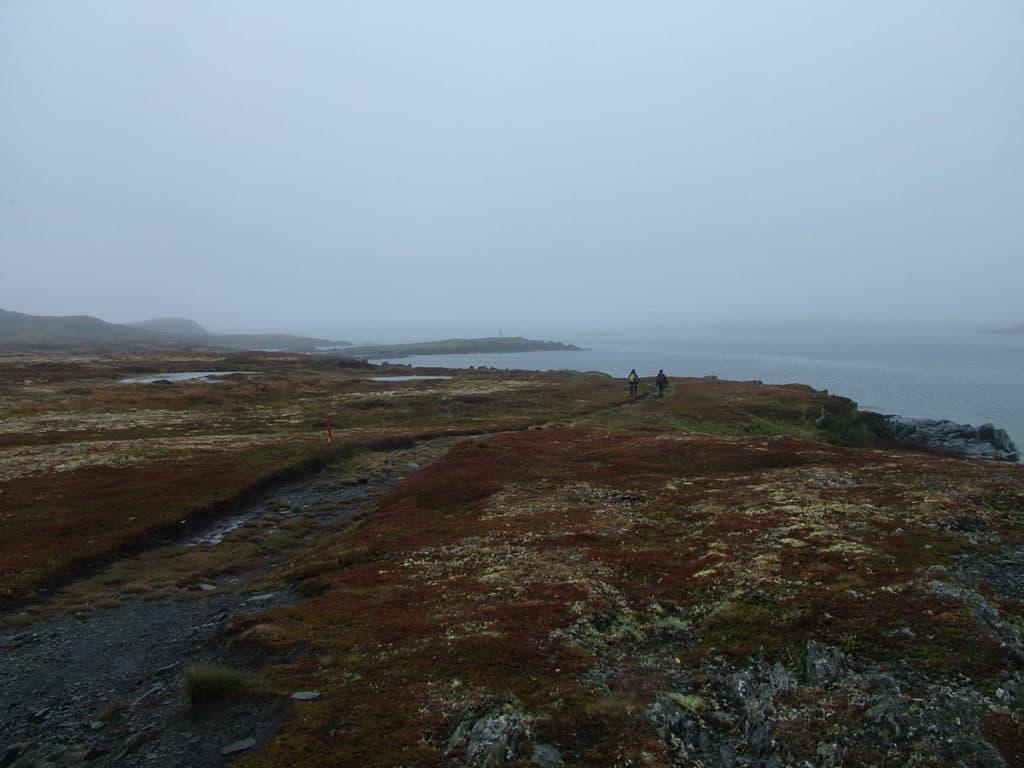
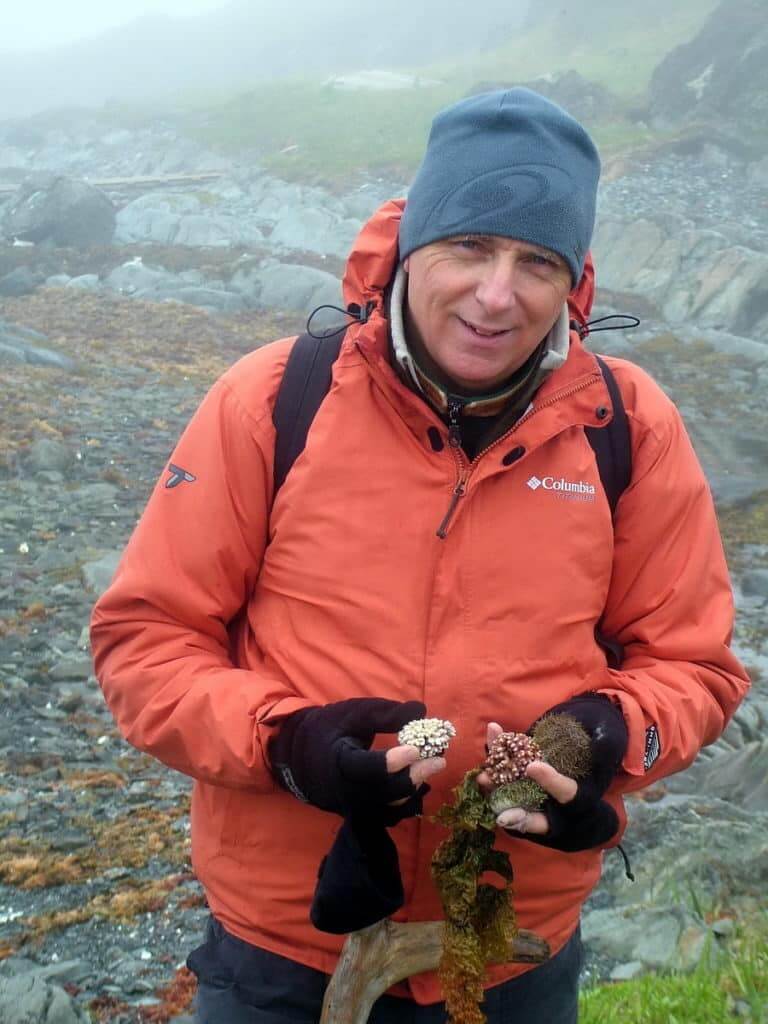
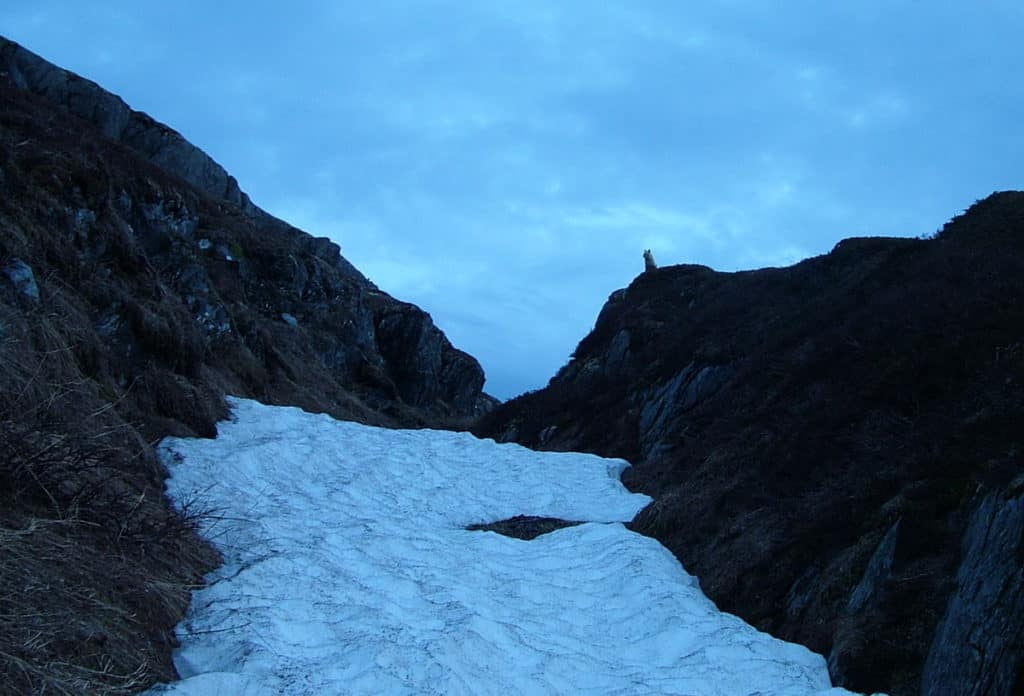
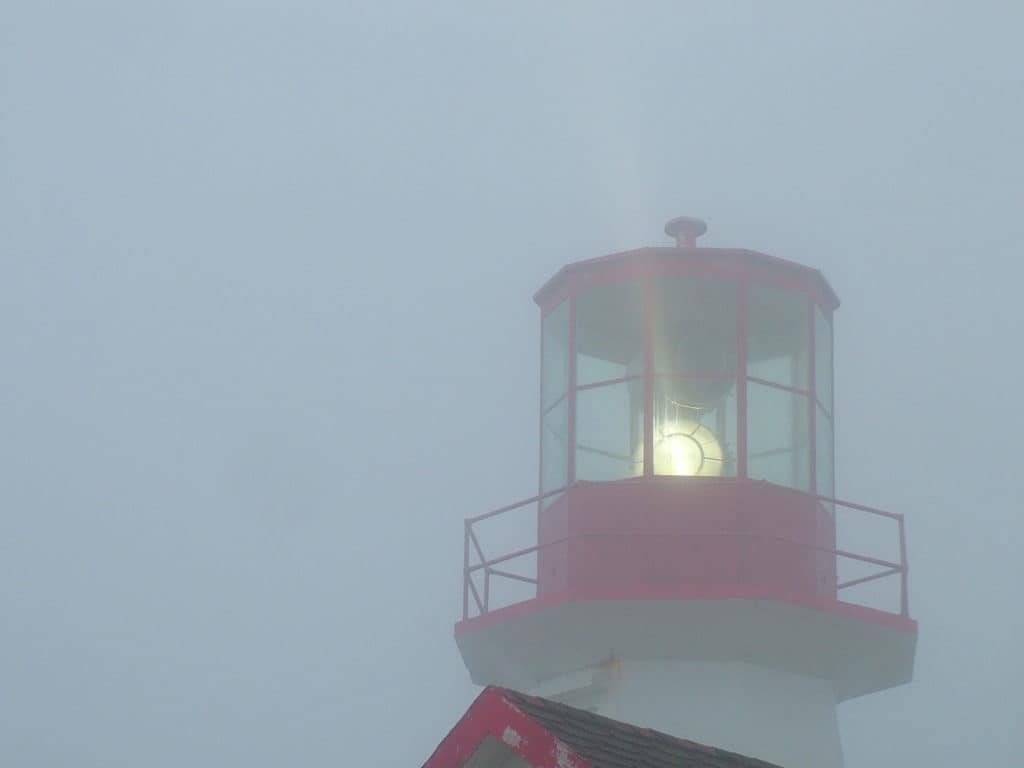
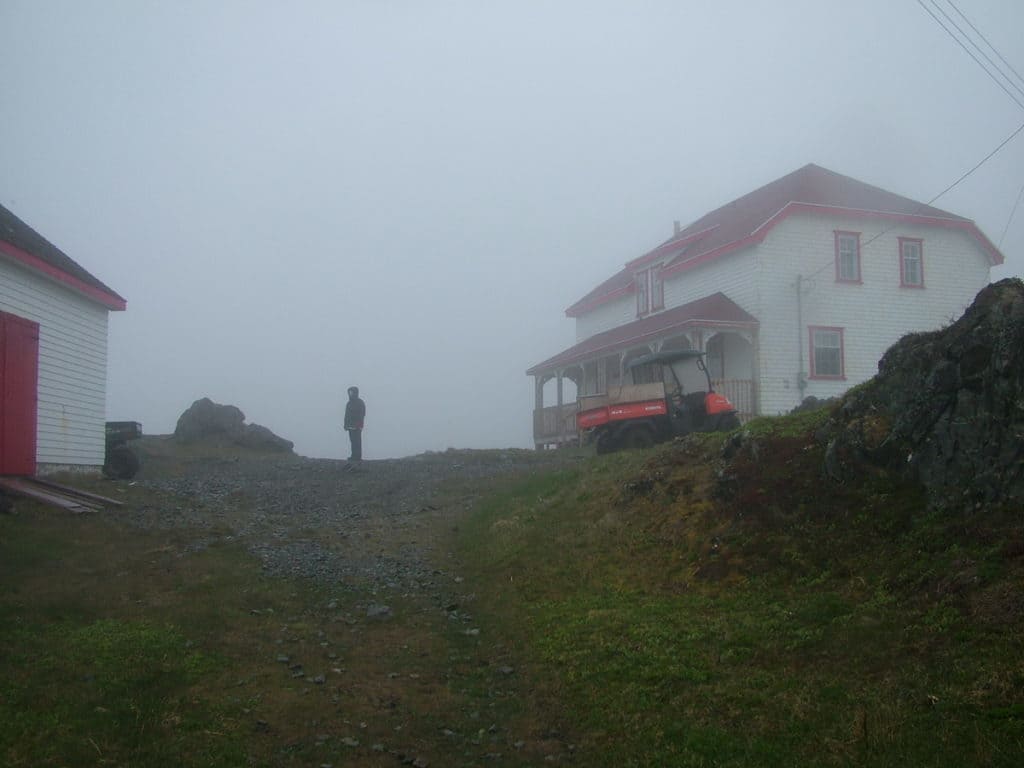
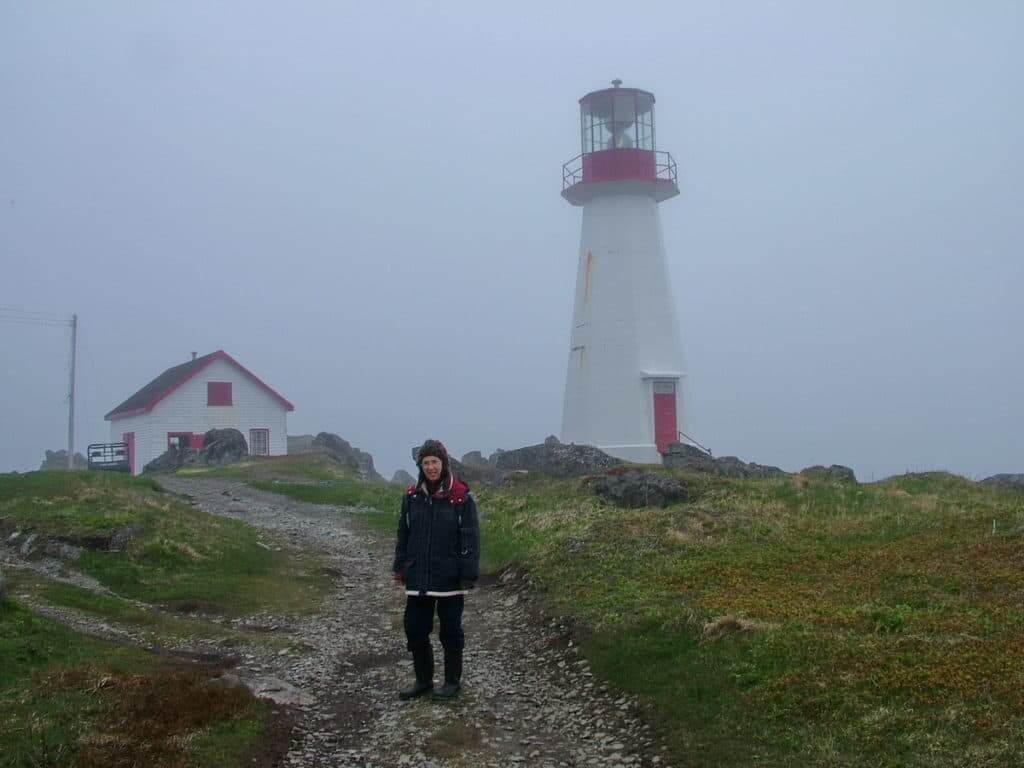
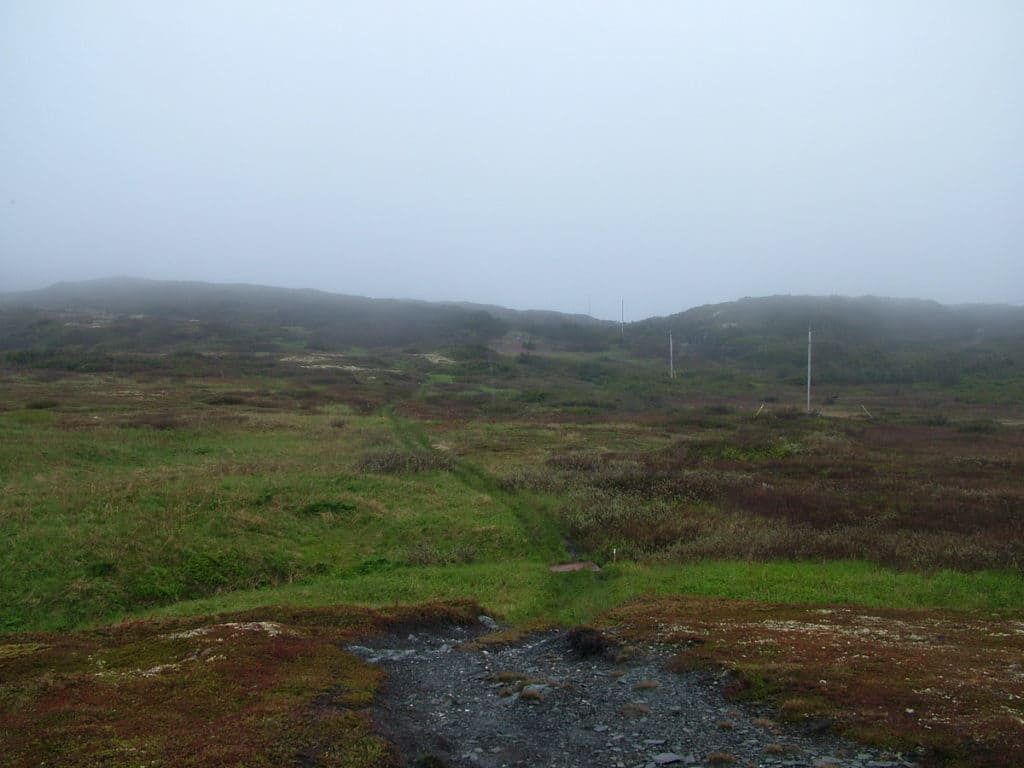
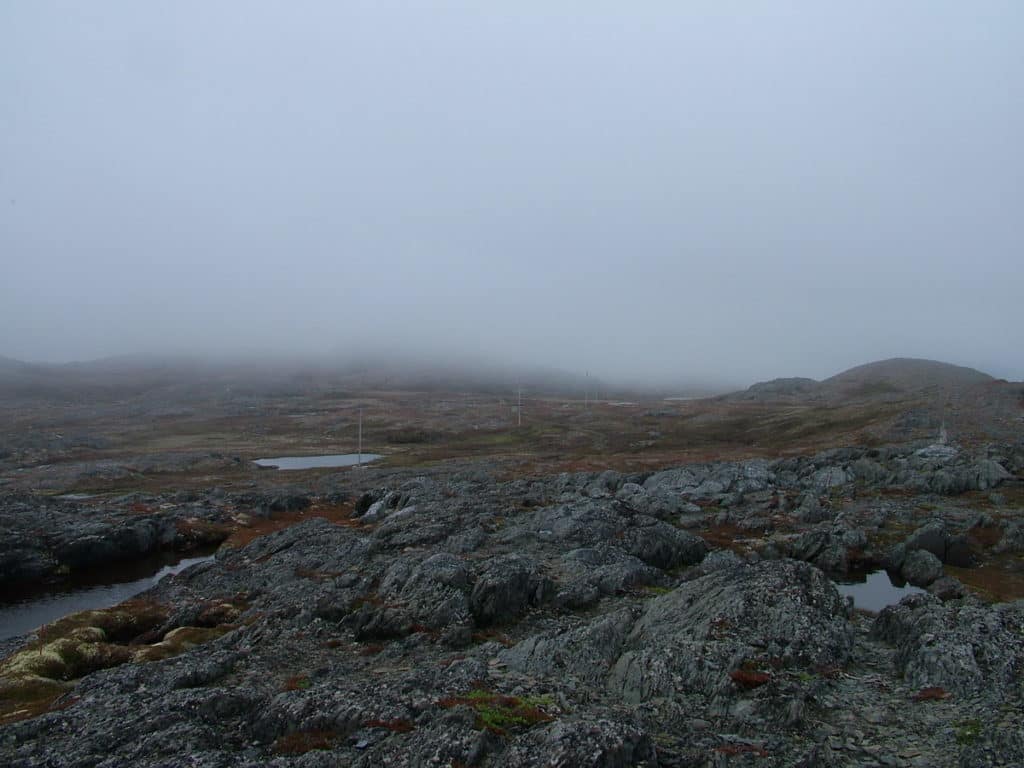
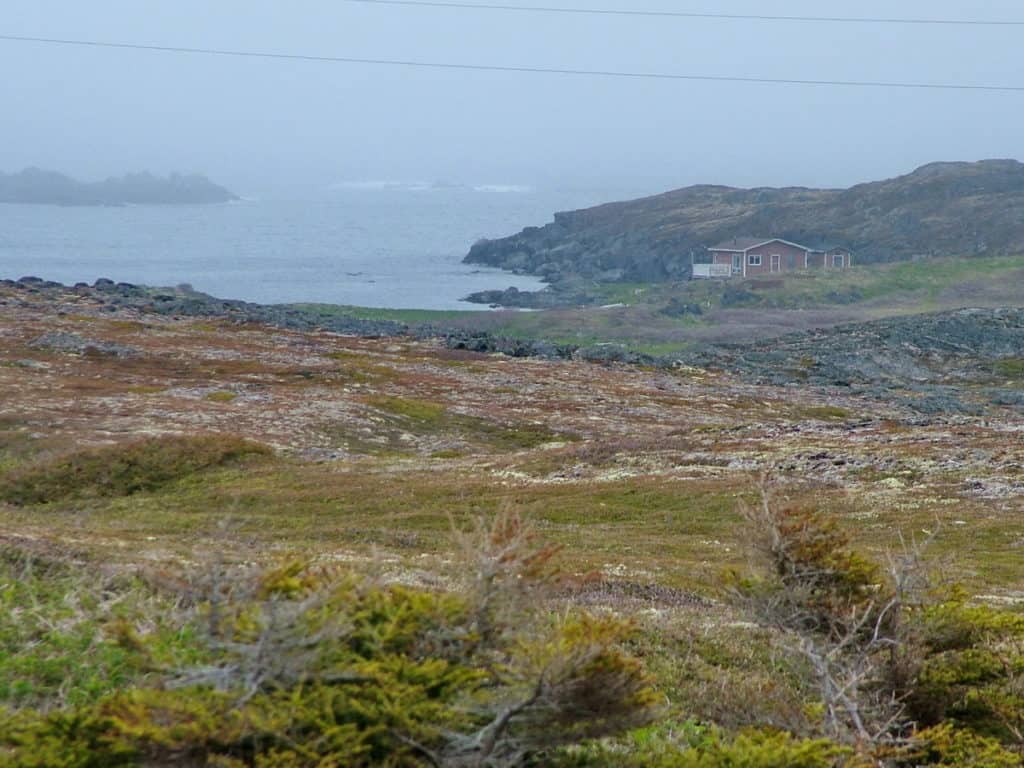
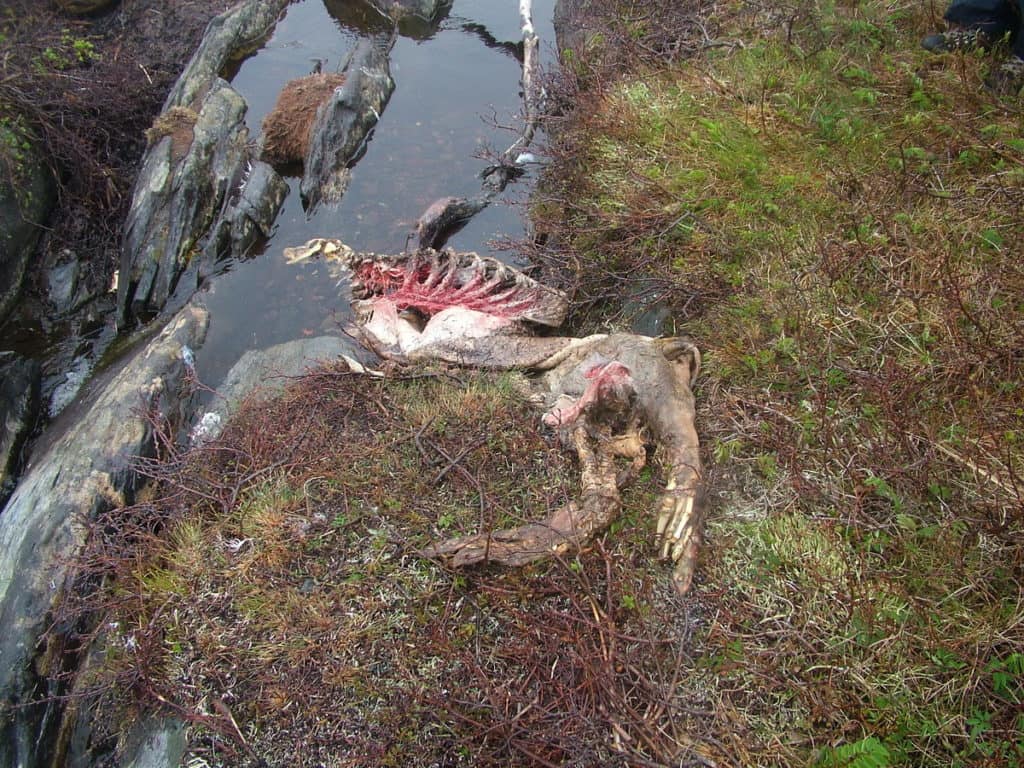
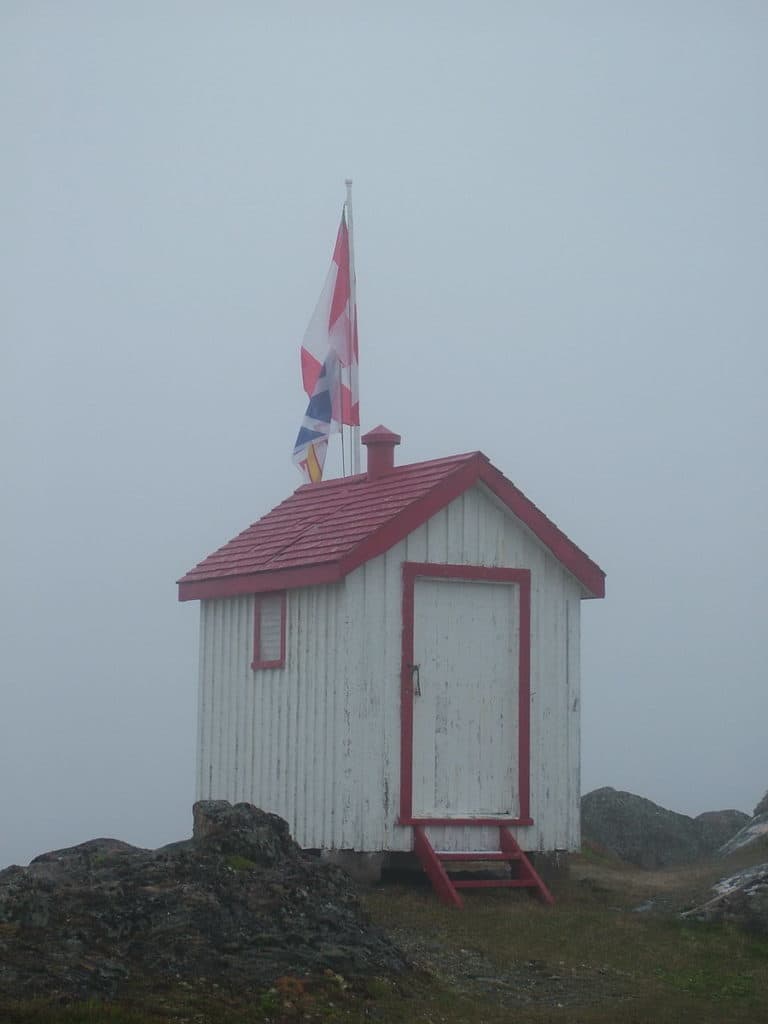
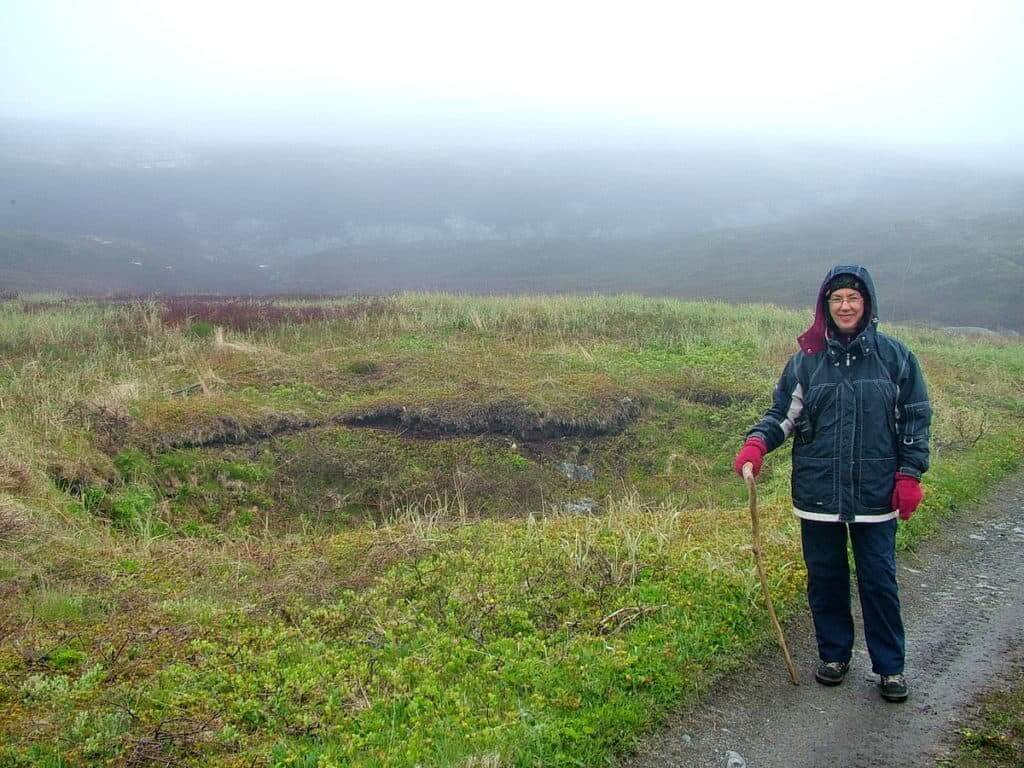

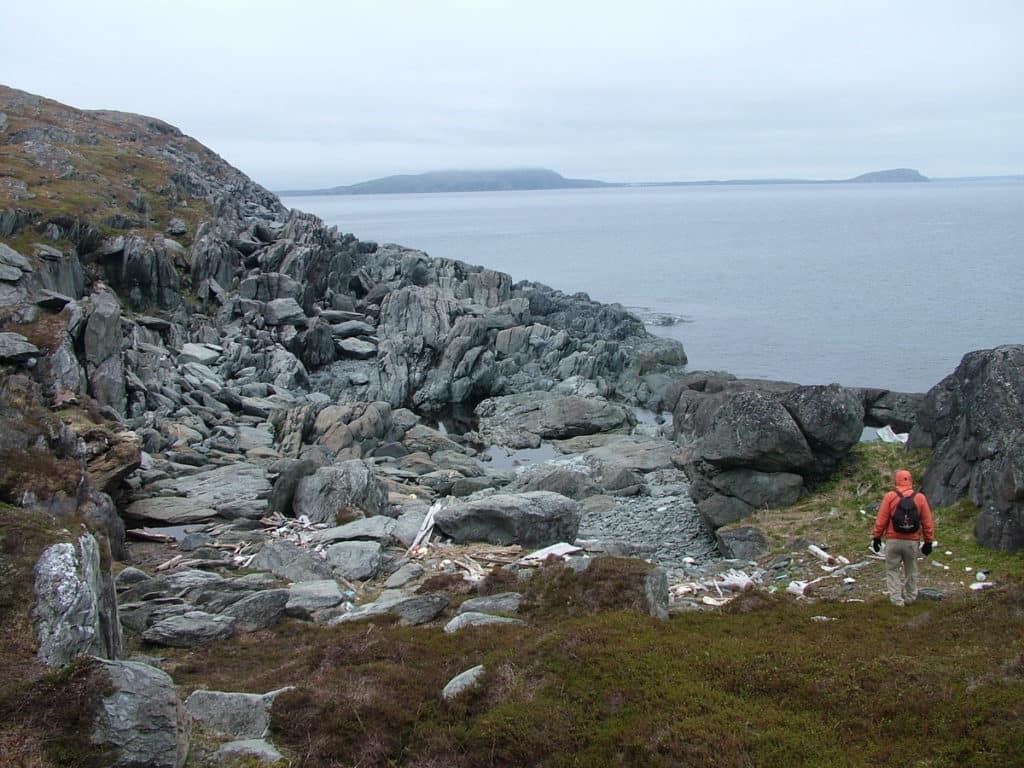
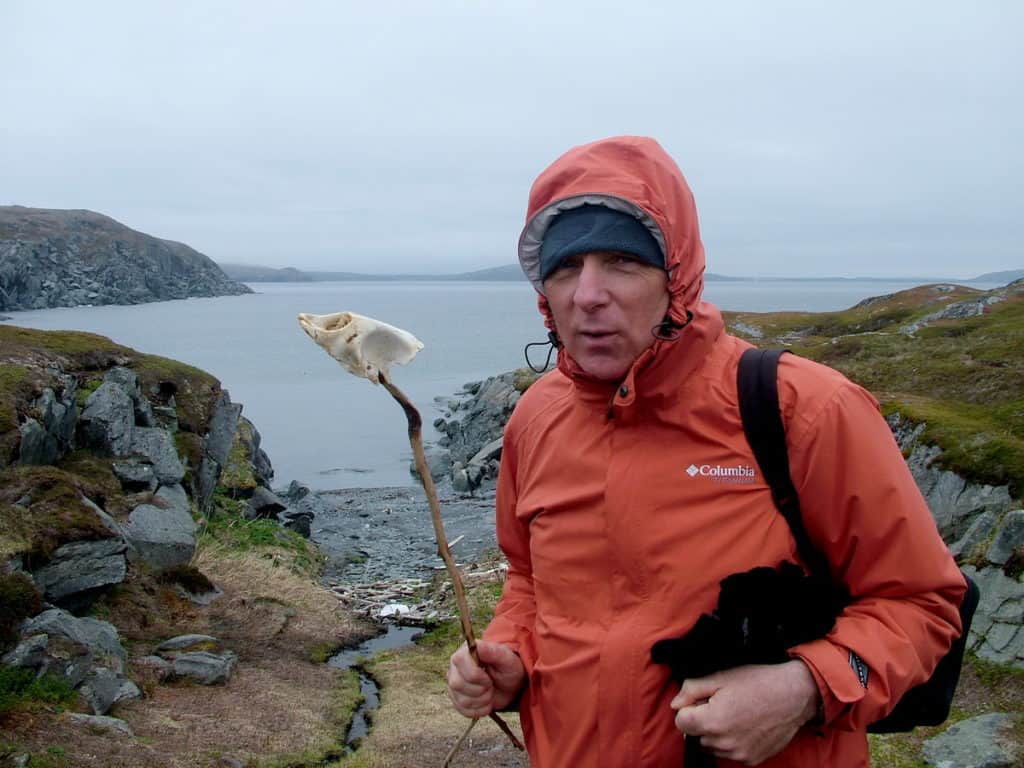

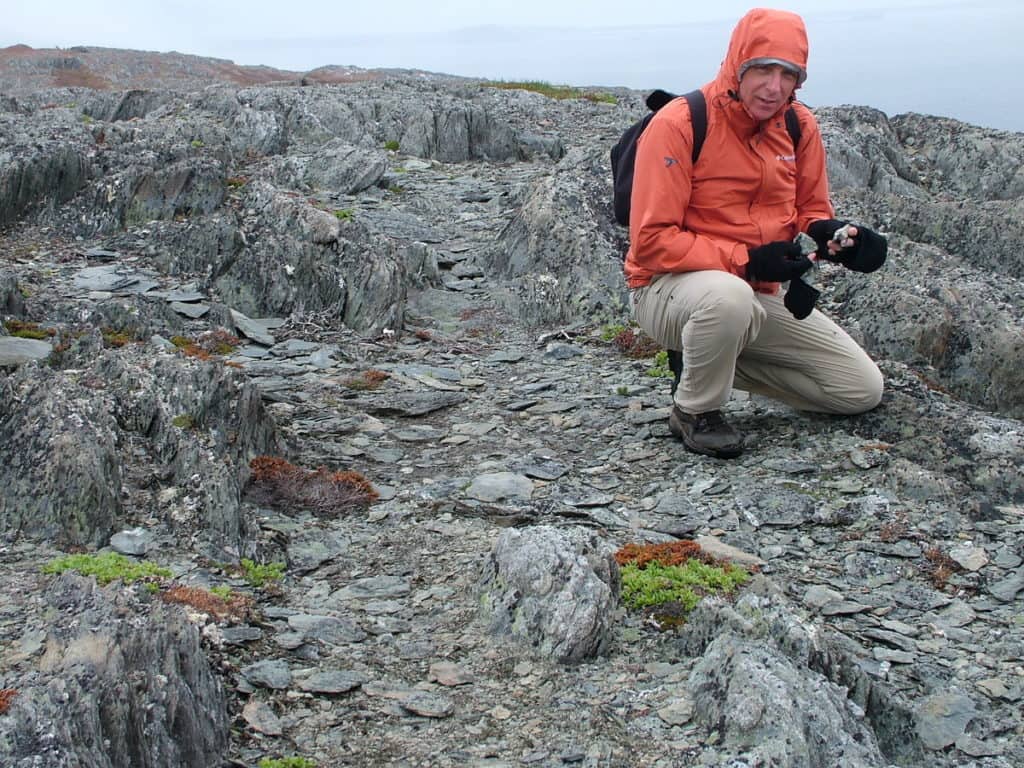
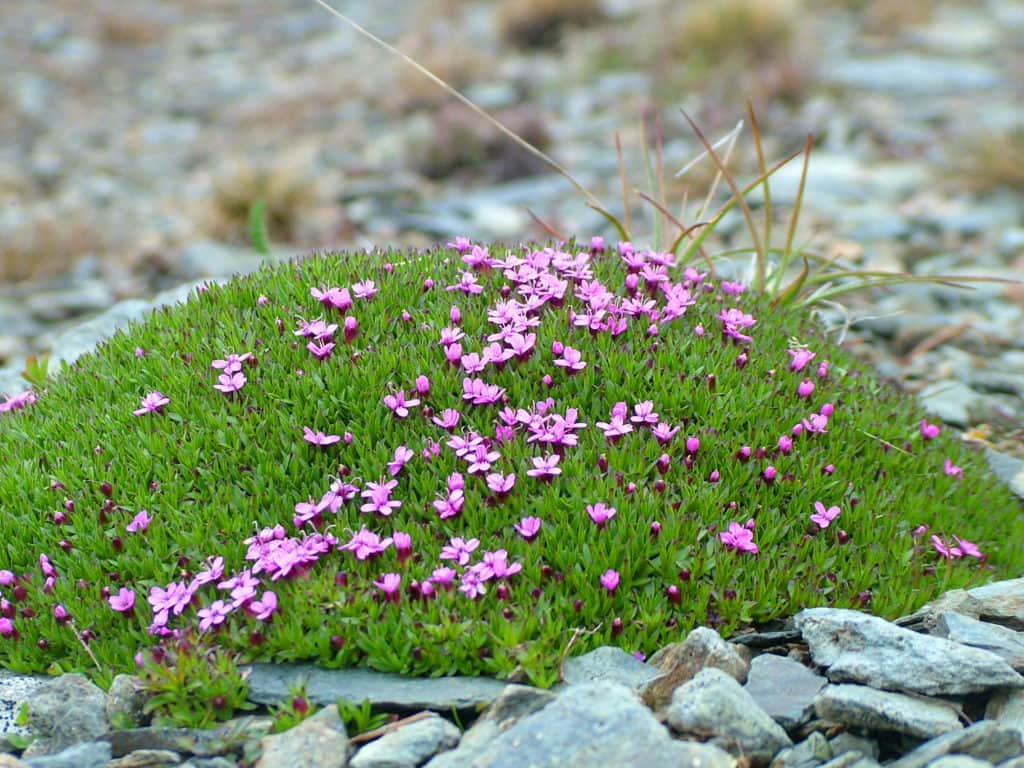
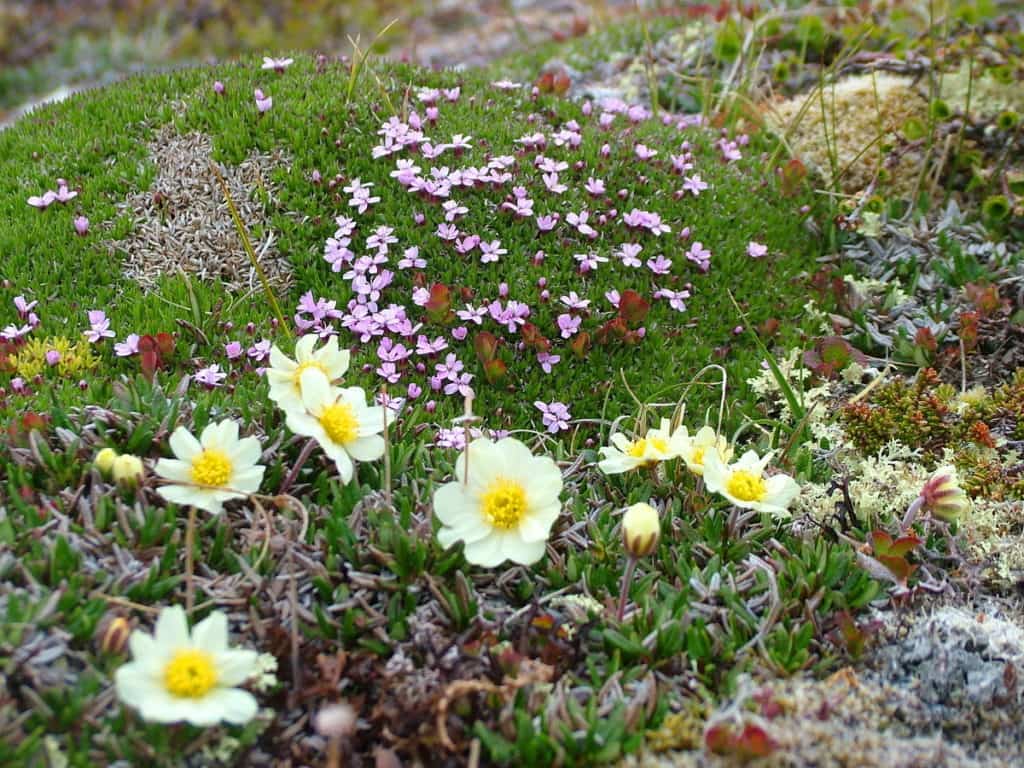
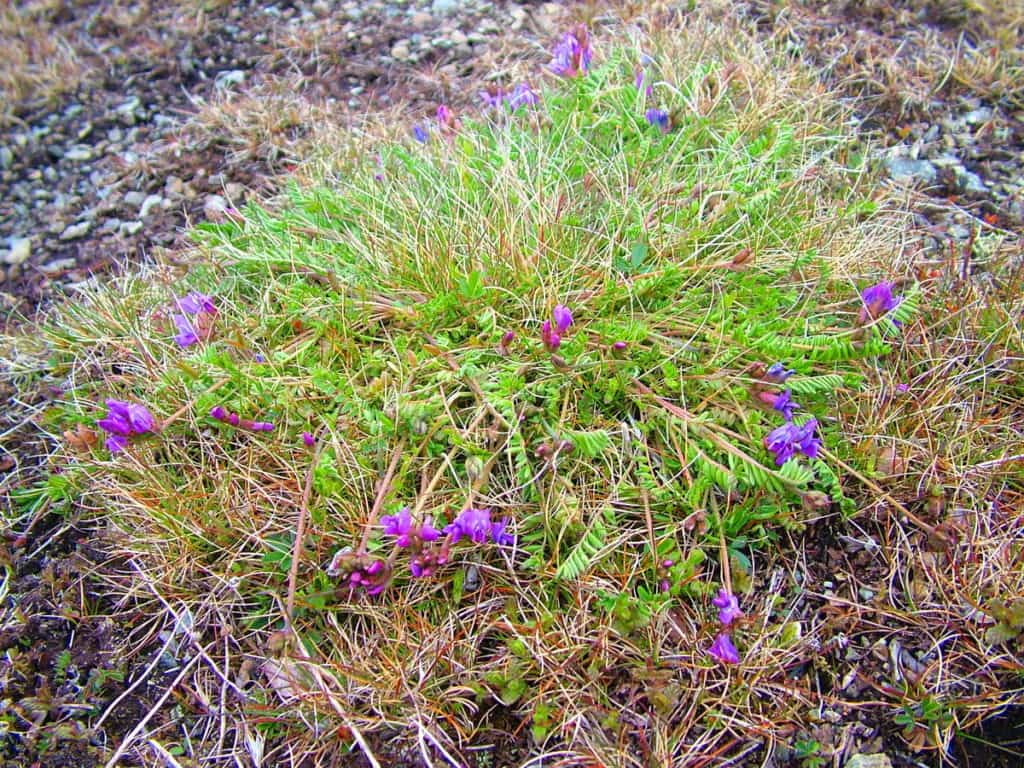
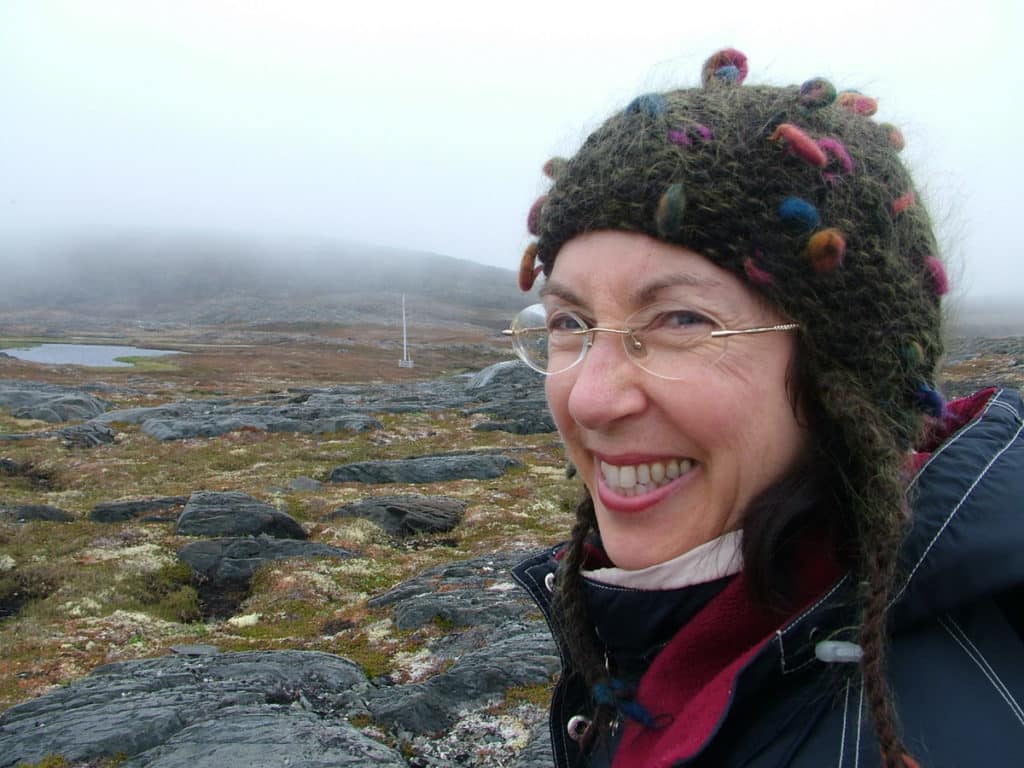
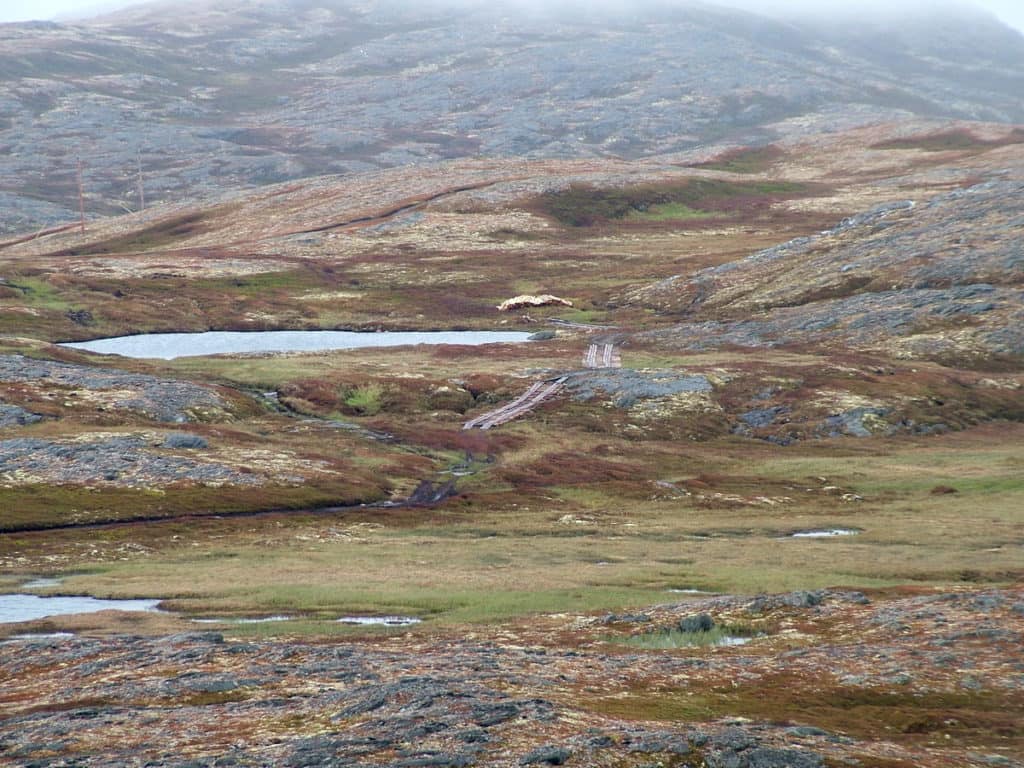
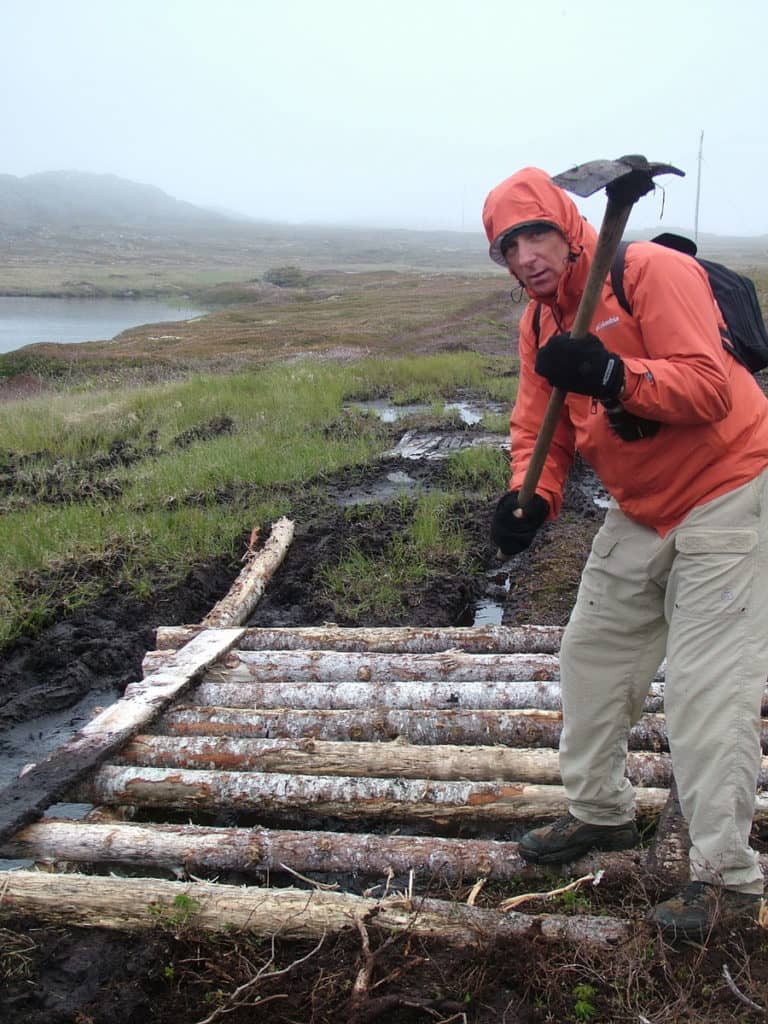
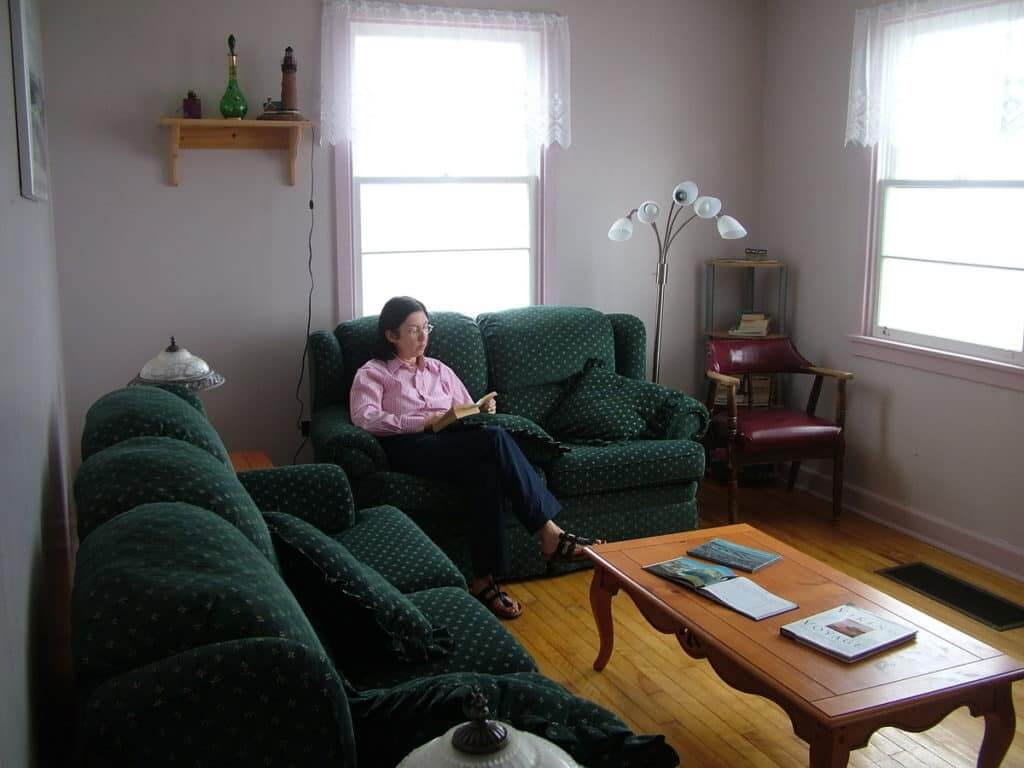
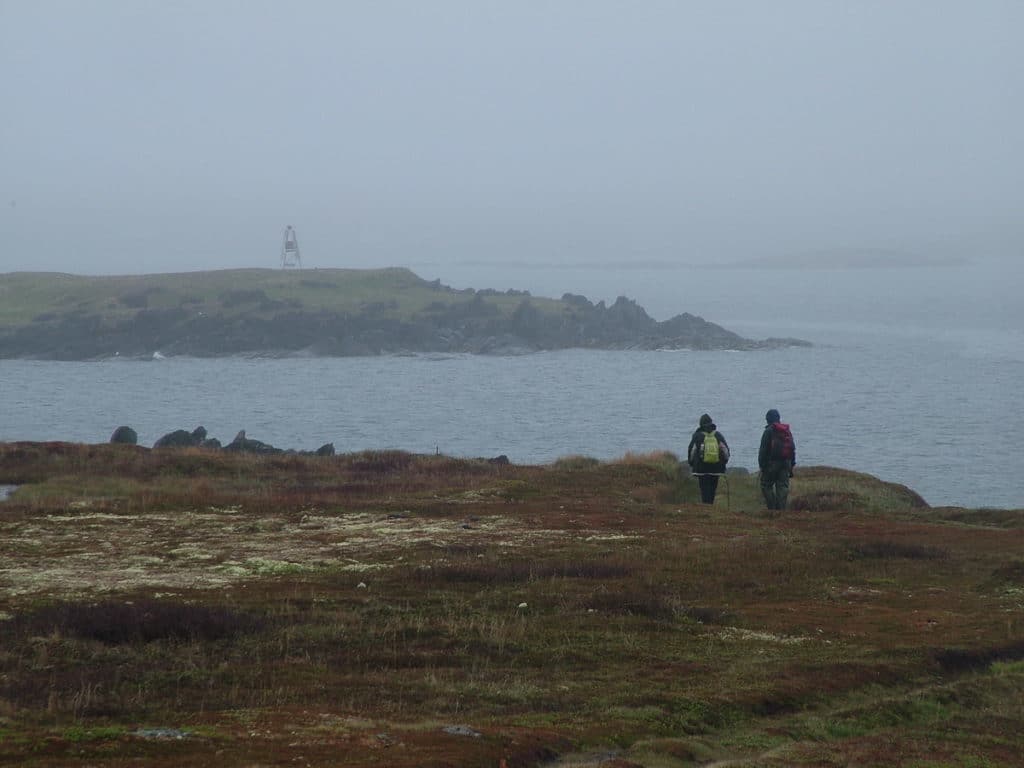
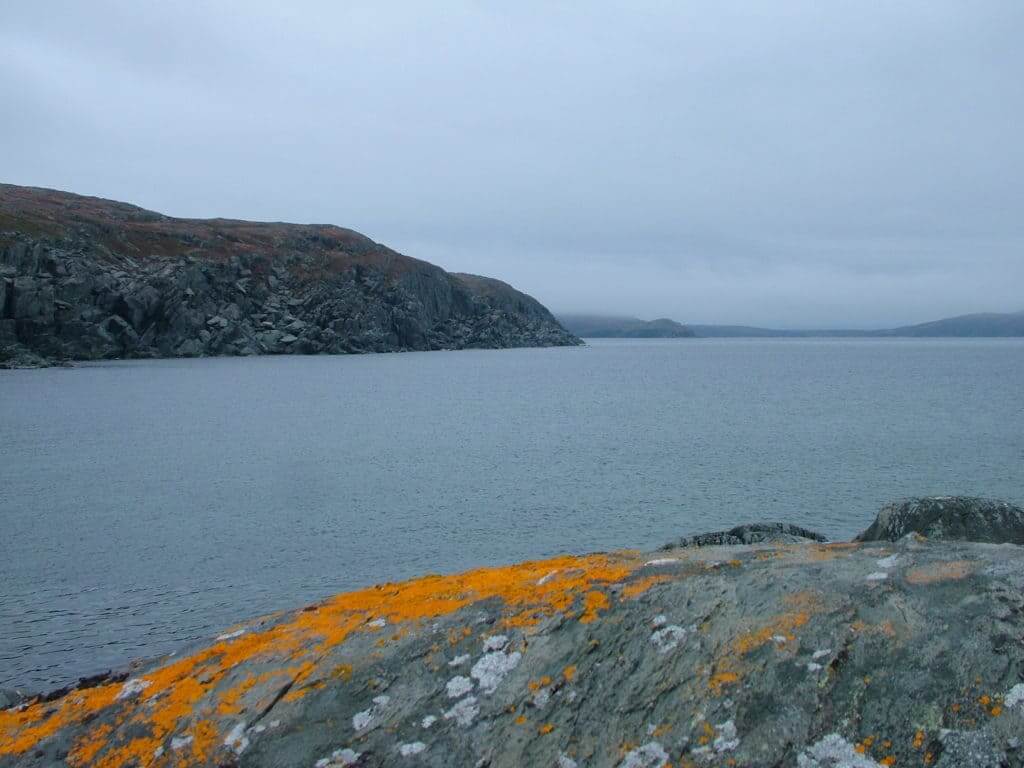
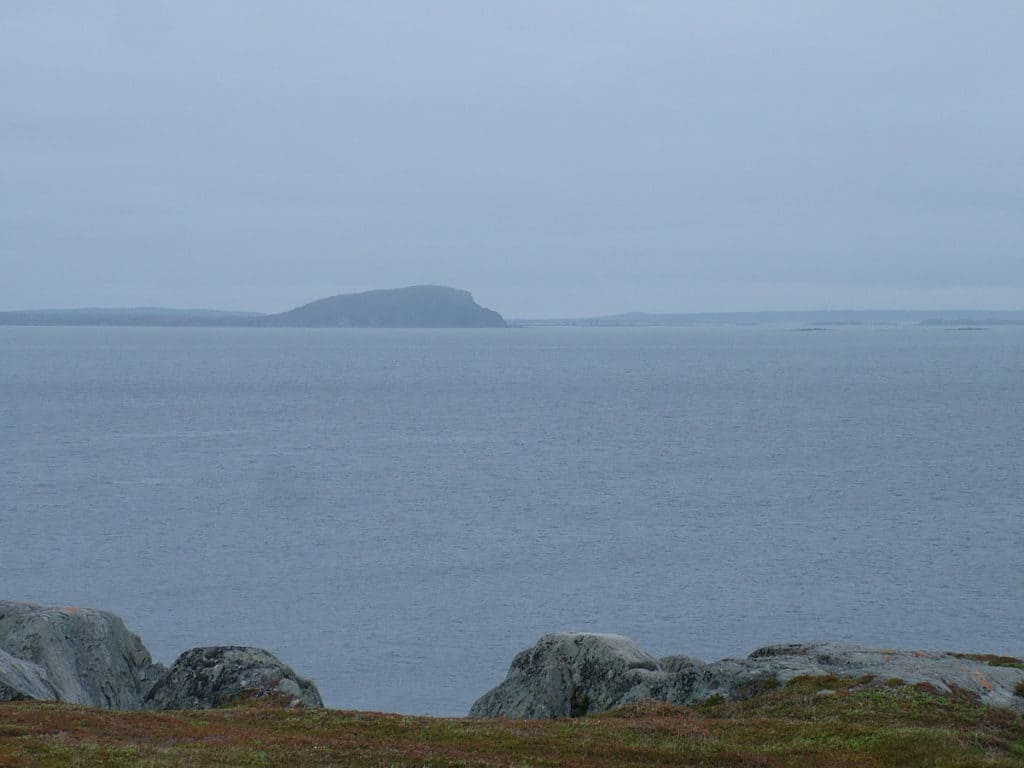
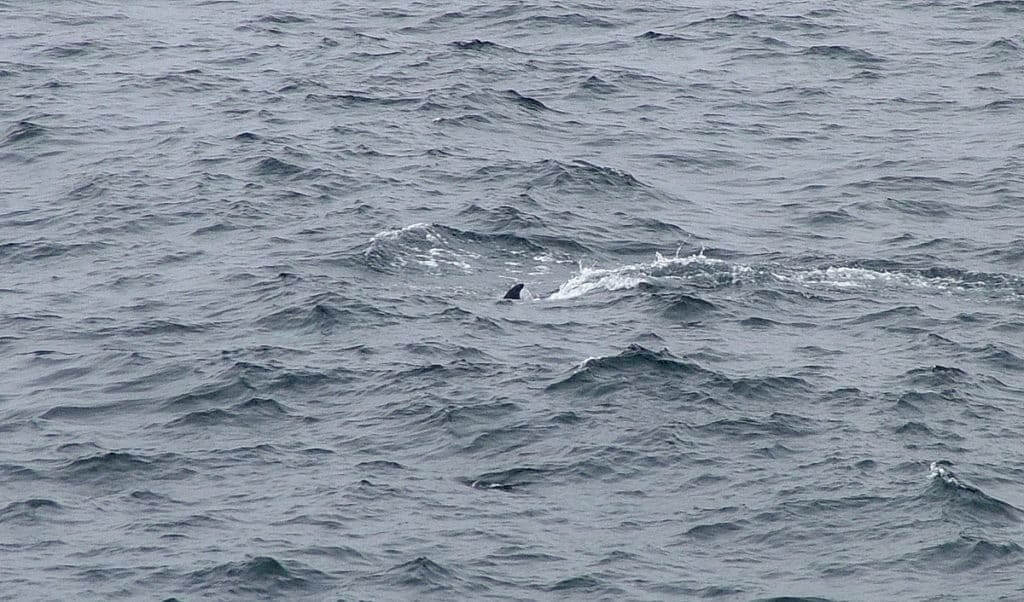
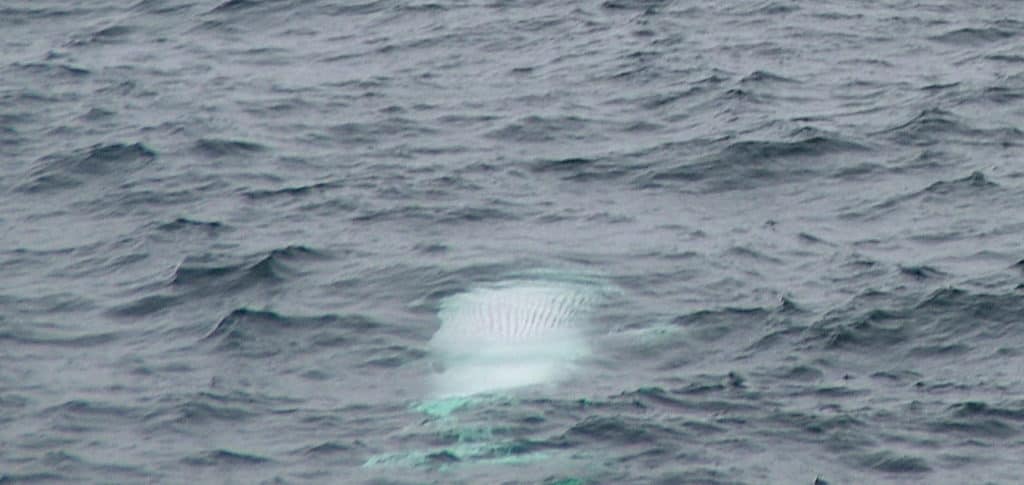
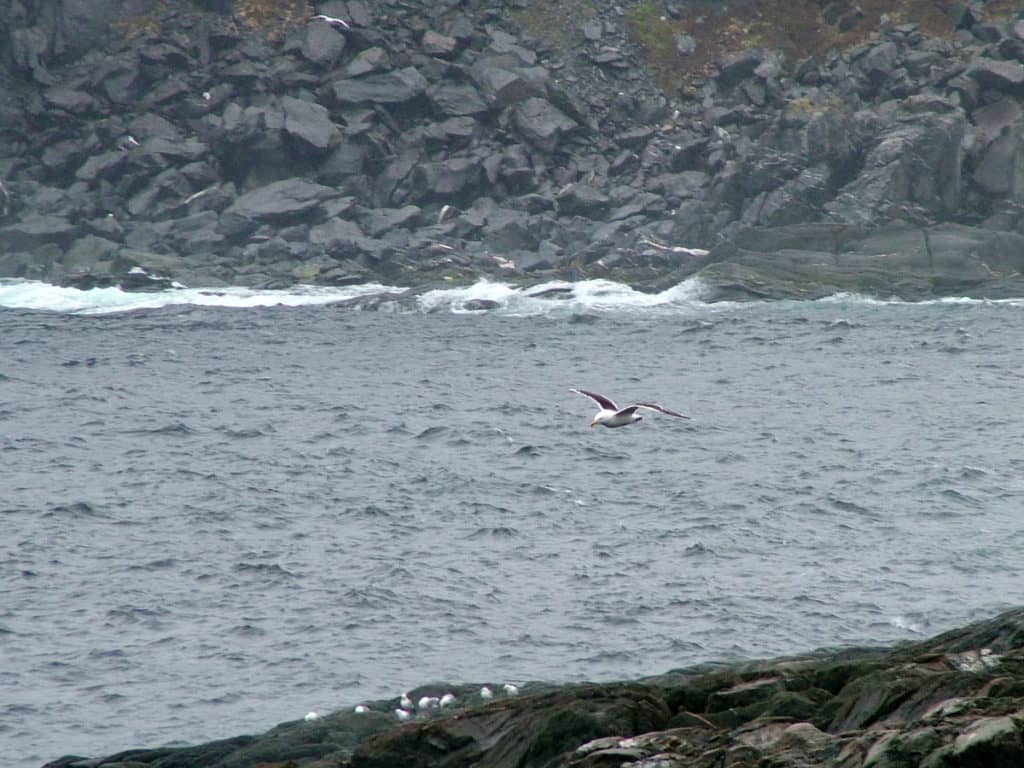
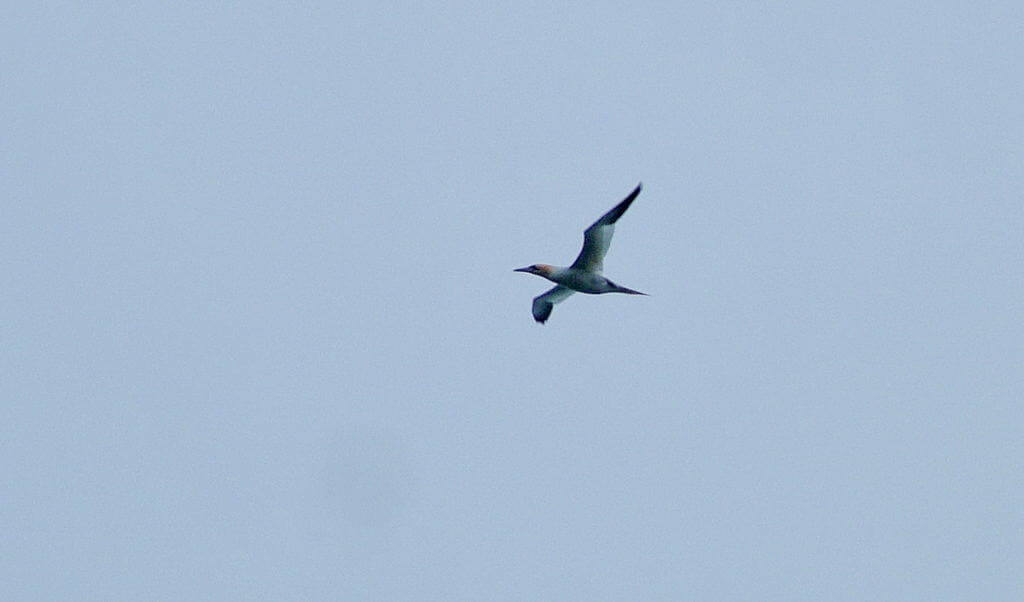
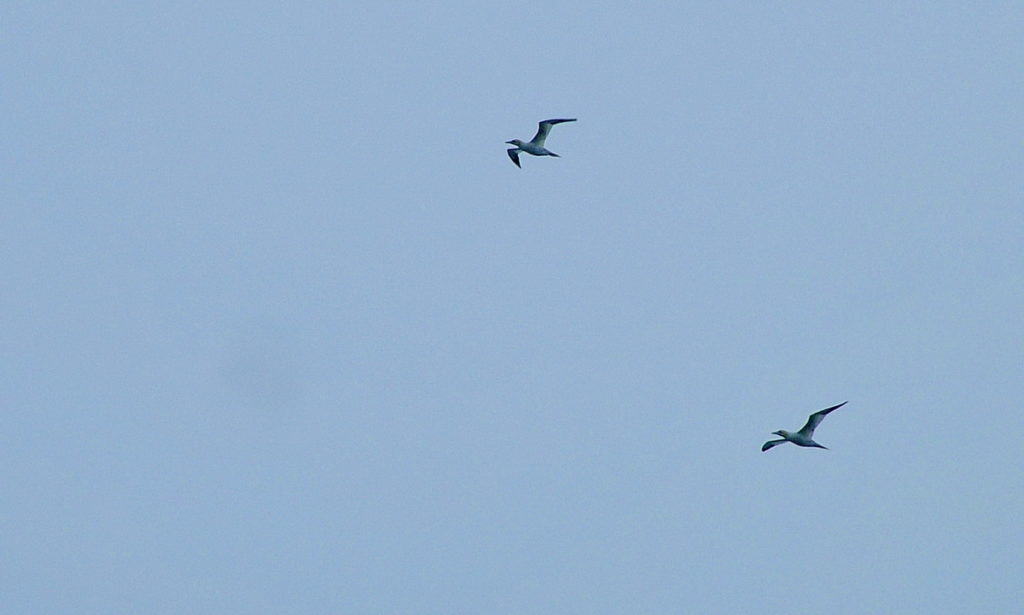
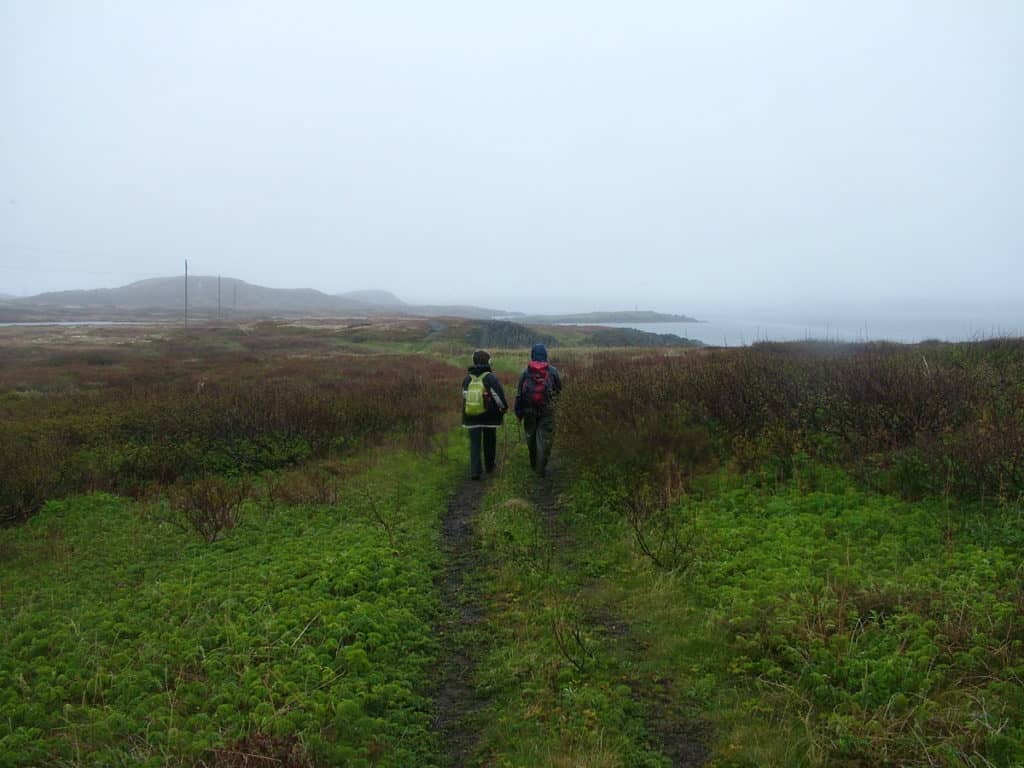
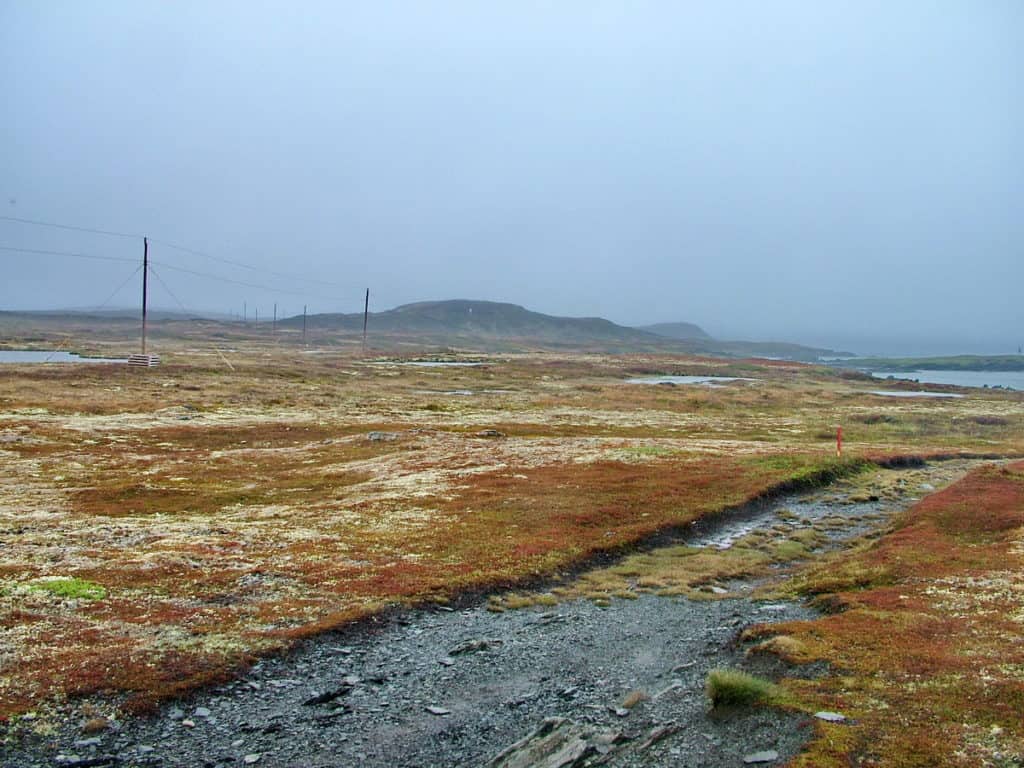
Hi Bob & Jean:
My wife and I have booked a 2 night stay at Quirpon Island Lighthouse between June 4-6th, 2024. Your review gave us an excellent idea on what to expect. We may need to revise our footwear and outerwear needs. Did you have any concerns about wayward Polar bears? Other than the fox you saw, are there any other larger animals, e.g., black bears. We will be spending about 2 weeks in Newfoundland and will read your other posts about this area with interest.
thanks for your posts,
Dwight
Good morning, Dwight. Thank you for checking out our blog. We always appreciate hearing back from our readers. No, we did not have any concerns about running into a Polar Bear while on Quirpon Island. The staff are well aware of wildlife activity on the Island so were able to assure us that there were no animals that would pose a threat at the time of our visit. That is not to say that Polar Bears never find their way to the Island, so you might get lucky, but I do believe these instances are connected to the ice floes and frozen sea water nearby. We didn’t hear anything about Black Bears on the Island, but again, the staff will be up to date on recent sightings of all wildlife. Feel free to reach out again to us if you have further questions after looking at our other posts. And Happy New Year!
Thank you for the virtual tour and for planting the desire in us to trace your tracks on Qiurpon Island. We have read many of Earl Pilgrim’s books about the area and the gripping stories of the ship wrecks at and around Quirpon. I boarded for one six month period back in the 60’s in Goose Cove nearby. The people there are just as Pilgrim presents. They are hard working, dedicated, honest, and free.
What contact did you use to make arrangements for your trip to the Island?
Ed
Hi Ed. Thanks so much for your feedback and for sharing your own experience with us. What an awesome opportunity you had staying in Goose Cove for such an extended period. We loved our time spent in Newfoundland. To answer your question, Robert booked our accommodations online using this link: https://www.linkumtours.com/quirpon-lighthouse-inn
Loved reading about the island. Being able to visit such wild and lonely places is such a gift—-and very humbling. Truly a place to gain some perspective on our relationship to the natural world. We stayed on Battle Harbour island in Labrador several years ago. Another wonderful experience.
Hi Martha. Thank you so much for reading our blog and for your thoughtful feedback. I agree that being in remote and rugged places really helps us to get in touch with nature. Battle Harbour Island sounds like a place of interest. We will have to look into it and learn more. Thanks again for getting in touch.
loved your story about quirpon island places you have been I can only imagine god bless you in future travels xox
Thank you so much Mavis.
I really enjoyed your story about quirpon island you sure have had some great adventures that I can only imagine god bless you both for all your future adventures xo xo mavis burton
Hi Mavis. So glad that you enjoyed reading the account of our stay on Quirpon Island. It was a most interesting place and the people, like everyone we encountered in Newfoundland, very warm and welcoming. Thank you for your blessings and for taking the time to send us feedback.
Great adventure story. What time of year did you visit?
Hello. Thank you for reading our blog story about Quirpon Island and for taking the time to comment on it. We visited Newfoundland in the month of June.
Loved reading about your adventure!
Thank you for your comment, Carol. Glad you found our adventure interesting. It is feedback like yours that makes writing our blog so rewarding.